#Firion of Fynn
Text
i don't know shit about plants or japanese and i only just pieced together that the final fantasy wild rose might look nothing like what i think of as a rose (more properly called a hybrid tea rose. i guess!).
the wild rose (which now is probably best known to people via FFXIV) in final fantasy is always a reference back to final fantasy II, where it was a symbol of the kingdom of fynn adopted as a symbol and passphrase for the rebellion against the palamecian empire. ff2 actually had a keyword system where you had to use certain key phrases on other characters to progress the plot at various points, and the first of these you learn is "wild rose." in japanese, it's のばら, or "nobara", which apparently can refer specifically to rosa multiflora, the japanese rose (which is also, yes, the rose referenced in the name of character nobara kugisaki from jjk. also yes ff2 renders it in hiragana but afaict "のばら" with no other context generally indicates the japanese rose).
hybrid tea rose:

rosa multiflora, in various cultivars (unless they're rosa polyantha, again i don't know shit about plants):

(if i understand correctly, the above is an example of the classical wild japanese rose, and may be the intended reference)

(var. cathayensis)

(no idea)
anyways the whole time i was picturing a classical garden rose, with many-layered petals in red, because...in dissidia they have firion fucking carrying one around and talking about wild roses! its model:

no idea what's up with that. as far as i can tell there's no actual rose imagery in ff2 itself (neither the original nor any remakes) so there's no official indication from back then as to which rose they meant.
#ffxiv#final fantasy#wild rose#honestly the white wild rose fits better w/ the monochromatic scion palette
6 notes
·
View notes
Text
FF2 Villain/Character Talk: Leon
Because I have a lot of thoughts about this lovely little crumpet.
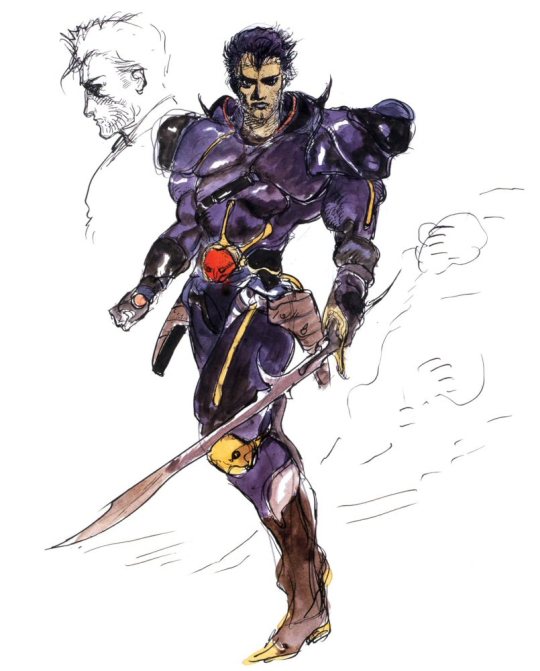
Final Fantasy II
Leon is one of the four main party members of Final Fantasy II, except that’s kind of a lie. While artwork and the naming screen suggests he’d be one of your companions, in the game you have him for the span of a single battle. When the party is revived, Leon is missing. While he is initially the driving force behind their initial trial to enter the rebellion, the party is forced to put Leon out of mind as they go on more missions.

(That’s him on the far right)
The biggest key aspect of Leon that is not immediately obvious is his family situation: Maria is Leon’s sister and only biological sibling. Firion and Guy, as their wildly different looks imply, are orphans that were adopted into Maria and Leon’s family. Maria and Leon do share an association with the color purple and are sometimes (but more rarely than you think) portrayed with the same hair color.
Leon only returns at the end of the game, where
He’s the Dark Knight.
He’s the Dark Knight of Palamecia.
He betrayed his family.

Throughout the game, the party has to contend with the Dark Knight of Palamecia. Initially, these encounters are straightforward with the party unawares although while the Dreadnaught is exploding, Maria realizes that she recognizes the Dark Knight’s voice. However, it’s only after the Emperor dies and the war appears to be over that the Dark Knight is revealed to be Leon, taking the throne for himself.
This twist is preserved to varying degrees depending on the version. The Famicom and Origins versions lack portraits, meaning that the twist is preserved. The PSP version gives the Black Knight a (somewhat doofy looking) unique portrait to preserve the twist. The path of least resistance is definitely the GBA version, which simply darkens Leon’s portrait, presumably hoping the original GBA’s lack of backlight prevents the player from noticing.

When the party goes to Palamecia and confronts Leon, Leon goes into a rant about how power is the thing that rules the world and he won’t let go of it. The GBA versions onward also throw in some lines about how the weak need the strong to control them and where he accuses the rebellion of throwing away lives by opposing the empire.
Then the Emperor returns from Hell.
Leon is taken with the party back to Fynn. While Hilda is shocked to see him, Firion asks for Leon to join the rebellion and she ultimately leaves the decision up to the party. Leon is clearly concerned about the death that the revived Emperor will bring, and at Maria’s request, he rejoins the party.
In the end, Leon helps the party defeat the Emperor, but knows that things can’t simply go back to normal. Leon leaves to go off on his own, and despite Maria asking him to stop Leon, Firion instead promises that they will meet again.
Leon is notable for being the series’ first Dark Knight. He’s moreso a Dark Knight in terms of title rather than ability as, outside of brainwashing the town of Bafsk, he doesn’t display any particular dark powers. Still, he is considered the inspiration for the job (alongside its variant, Warmage), with the jobs’ implied Hell connections potentially being a reference to him serving the demon-infested Palamecia. Spinoffs lean into this by giving Leon abilities that suggest that the Emperor did indeed give him dark powers.
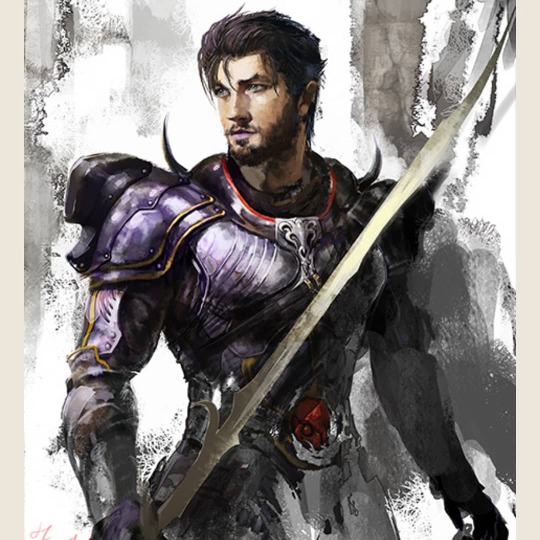
Prototypes
Leon’s genesis comes from two characters in the very early design document: A character named Leon who is “Part of Bamberg and a famous knight” and Rigel, a “Cold-hearted Dark Knight”. He may also have a bit of Ricard in him, one of the princes who schemes for the throne.
In the Early Plot, Leon’s role is largely the same as the final game, but the dynamic is wildly different; Leon being Maria’s biological brother is not mentioned in this treatment. Instead Firion gets the bulk of the emotional payoff, with the heavy emphasis on Firion and Leon growing up together and being brothers in arms (Guy and Maria are merely friends here). This implies that, as plans shifted, Maria absorbed the sibling relationship with Leon from Firion. Some descriptions such as Leon’s FF2 Dawn of Souls/PSP manual description or his Opera Omnia description suggests that he is still best friends with Firion, but for obvious reasons, this is never shown in game (unless you pull an Ultimania and generously interpret his “I knew you’d come Firion” as him respecting Firion’s strength).
Additionally, Leon wouldn’t hide his identity from the party. Not only that, but during his encounters with the party, he would try to sway Firion into joining the Empire, a sharp contrast from the final game’s Leon who seems to have rid himself of his feelings for his family. In fact, Firion is the one who has to cast aside his feelings to fight Leon.
Last, but not least: The treatment specifically says that Leon sought to act as the Emperor’s heir, implying that he respected Mateus in some way. In the final game, Leon is dismissive towards the Emperor’s return, refusing to hand over the throne. There’s also a bit where Firion points out what the Emperor became, asking Leon if he intended to become that, furthering a parallel between the two, but that’s moreso a Firion thing, so I’ll just save it for another day.
Regardless of these changes, Leon’s primary role in the game was fixed at this stage, being that he would join the Empire as the Dark Knight and oppose the party.
The third and final treatment is largely the same, although Leon has now shifted to a form close to his final version self. Still, a few things stand out: First, Leon is noted as “the rival” of the game. Second, building on the previous point, Leon is listed as an enemy like Borghen and the Emperor, suggesting that he would have been a proper boss fight (this is also hinted at in the previous treatment, where it mentions the party fighting Leon several times). Lastly, it mentions that Leon ‘comes to his senses’ after the Emperor returns from Hell, though whether that’s literal (suggesting that he was brainwashed) or figurative (suggesting he was not) is unclear.

Other Portrayals
Leon appears in the Labyrinth of Nightmares novelization of Final Fantasy II (That One With The Emperor’s Name). Information on said novel remains scarce unfortunately, as it has never had an official english translation and neither of the two known fan-translations have gotten deep into the book before going on indefinite hiatuses. What little is translated shows Leon in a foul mood due to his betrothed abruptly marrying another man about a month after giving him the equivalent of a marriage proposal (long story), though he pretends not to be upset in front of others like Maria. The sequence portrays Leon as someone who can mask his emotions, able to hide his grief and bitterness from Maria for almost a year; Had it not been for Firion eventually explaining, Maria would’ve never realized.
The book also goes a bit into Leon and Maria’s family life: They live in Mysidia in this portrayal, their father is master hunter and Leon is aptly following in his footsteps. He’s also stated to love Maria with “much greater than any esteem he had for himself, even dropping his anger towards Maria and Firion due to the former convincing the latter to teach her how to be an archer.
Leon’s characterization pre-downward spiral is also displayed in the prologue. He’s said to be one who values peace over his own happiness and his love for Maria is such that his refusal to teach her to hunt is moreso rooted in concern for her safety. On the other hand, Leon is shown to be somewhat petty, privately applying his annoyance at his former fiance’s marriage to all women after witnessing it.
Leon also has a childhood pet (implied to be a dog) named Perry. Perry is close to Leon, to the point that the dog is probably the one individual that Leon is emotionally open with at least until he succumbs to demonic madness and ends the poor pup on the spot.
Details from here become scarce. One thing that I can seemingly figure from a fansite is that, despite his claims during chapter 2, Leon stops caring about Maria in his madness and instead shifts priority to Firion. The novelization takes cues from earlier drafts (Alie, Borghen actually being threatening, etc) so this would be one of those.
Interestingly, an interview with Keniji Terada that predates the novel mentions that he was writing a prelude of sorts centered around Leon. It’s unclear if this story ever made it to magazines, but it’s likely that it evolved into the Labyrinth of Nightmares novel.
Leon also appeared in the Memory of Heroes adaptation. I’ve covered the novel a lot on here previous so the brief take is: Outside of nuances such as having a recognizable self-taught fighting style, Leon’s role is almost exactly the same as the game . The only significant difference is that Ricard passes on the light he was blessed with to Leon. It’s thus implied (in the novel’s canon at least) that he has a connection with the Zauver the Thief from the first part and consequently Ingus from the third part.
Leon’s made numerous appearances in FF spinoffs, mostly the mobile game titles. Due to the simplicity of said titles and how they use their characters, Leon is usually portrayed in his mid-FF2 form, i.e. as an antagonistic Dark Knight. Opera Omnia, being post-FF2, portrays him firmly on the side of good, albeit with the Emperor briefly brainwashing him in a way that implies that his lust for power still exists somewhere within him.

Legacy
As mentioned prior, Leon technically started the trend of Dark Knights (and their related job Warmage/Hellblade). Guidebooks for the original releases of III and IV allude to this, as both feature backstories about a knight named Leon who uses Dark energy. Even today, Stranger of Paradise has a passive for its Dark Knight job that mentions “memories of a power-hungry Dark Knight” (paraphrasing) as a clear nod.
It is also possible that Leon inspired another character: Kain Highwind. Kain is the best friend of Cecil Harvey, the Dark Knight-to-Paladin protagonist of Final Fantasy IV. Despite this, Kain ends up coming to blows with Cecil; While this is revealed to be the result of brainwashing, it is implied that the form of brainwashing that the main villain uses is one that roots itself in the targets’ insecurities. Thus, Kain’s envy of Cecil and desire for Rosa to be his are implied to have existed in him even prior to the start of the game. In the end, Kain goes to Mt Ordeals, in hopes of someday overcoming his moral weaknesses. For bonus points, it’s said that Kain had potential to be a Dark Knight, but preferred to follow in his father’s footsteps as a Dragoon.
On a more coincidental note, there is Delita Hiral who, like Leon, was put into a traumatic situation involving his own powerlessness and the death of a sibling that ended with his apparent demise and both began to covet power as a result. However, Delita wants to use that power towards benevolent ends and in spite of his lashing out initially, he nevertheless keeps a somewhat amicable relationship with Ramza (moreso on Ramza’s end) while the mantra that Leon adopts is more suited towards Tactics’ villains (indeed, Dycedarg Beoulve reveals towards the end of the game that he has similar views regarding the relationship between the weak and the strong). As such, it’s more likely that this is merely a happy coincidence than a clear nod to Leonheart.
Conclusion
Leon is an odd character in that he’s interesting in spite of how little screen time he gets. So much about him is shrouded in mystery due to the nature of Famicom-era Final Fantasy storytelling: There’s not even a proper intro in a number of versions of the game, we’re given no real info on what life for him and his siblings was like prior to the Empire’s invasion, even the assertion that he’s Firion’s best friend is only barely alluded to due to the nature of the game. And of course, there’s his role as the Dark Knight; Was he brainwashed or did he willingly turn turncoat? Did he always resent the Emperor or was it more akin to a Chirin’s Bell/Ringing Bell situation? And where does Leon go off to, after the game ends?
I dunno. I just think he’s neat.
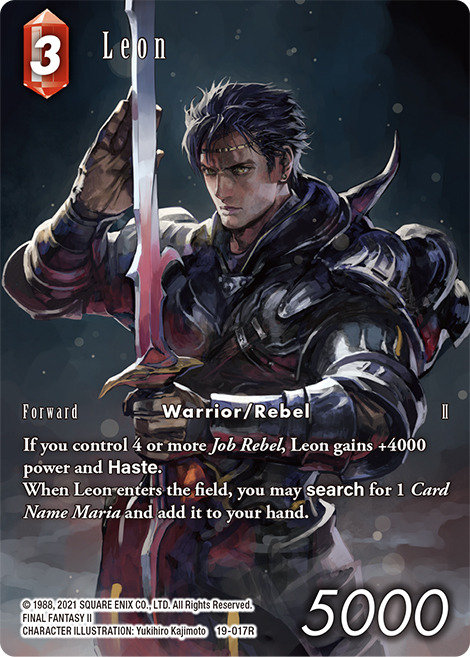
#Final Fantasy II#Final Fantasy 2#FFII#FF2#Leonheart#Leon#Lionheart#Leonhardt#Firion#Maria#Palamecia#The Emperor#Emperor Mateus
49 notes
·
View notes
Text
so after i got the information that in the console versions of the pixel remasters you can switch to the OG soundtrack i caved in and with the power of my amassed nintendo gold points got the ff2 pixel remaster yesterday evening. (context: i'm a pixel remaster hater) (but I'm also on my quest to having played every version of this game available)
i've played about an hour so far (just delivered the mithril) and here's my observations:
while i still think the character sprite work is only rivaled by the psp version in ugliness i have to admit overall it looks better than at least the psp version. the battle effects (like magic) look so much better as actual pixel art. environments look pretty. you can actually change the font to look slightly less horrible by choosing the alternative setting in the options. really not as ugly overall as screenshots online make it out to be. i have to admit defeat here. dont understand why they wont let us change the textbox colour tho.
absolutely stupid that they got rid of character portraits in dialogue boxes. "it's supposed to be close to the original release" - bullshit. this version is as close to the original as literally every other remake this game got. plus some optional quality of life so arguably actually further removed from the original than any other version of this game.
the music box in the extras menu won me over. there was minwu walking along a little road whistling little music notes and suddenly gordon stood in the way and got run over and they both fell to the ground. this is the content i'm here for.
in the german translation the king of fynn says he got shot in the butt and that is not what the english translation says at all and it kills the mood bc the man is dying but it amused me so thats a positive point as well
minimap in dungeons feels cheaty as hell but also who the fuck cares, the dungeons in this game aren't spectacular enough to warrant an actual exploration challenge. means i'm glad the stupid map is there.
overall decent version so far and actually playable with the OG soundtrack selected. i think i might end up prefering this version over the psp release. in which case the only thing the psp version has going for itself at this point are the character portraits. but at least it has the best character portraits of all available versions.
edit: wait i forgot something
minwu is white. i mean i knew this before, this wasnt a new shock but i still cannot believe they whitewashed the man to be as white as untoasted toast
so is firion but that transition already happened years ago with dissidia so its less of a shock. still. holy shit square enix leave your brown characters brown please i cant deal with this
#what was it about that cat lady in ff fourteen who suddenly was white in a new patch adn they went “oh she just had a sun tan before uwu”#those motehrfuckers lmfao fnjkernkejnker
8 notes
·
View notes
Text

Name: Mateus Palamecia
Age: 32
Race: Human/God
Gender: Male
Sexuality: Superiorsexual
Residence: Castle Palamecia (Light-Arubboth/Dark-Pandemonium)
Occupation: Emperor of Palamecia, Ruler of Heaven and Hell
Fighting Style: Sorcerer, Trap Master
Height: 6'3" (192 cm)
Hair Color: Platinum
Eye Color: Periwinkle
Notable Features:
His demeanor moves the Emperor to raise his chin, looking down on all others. His arrogant superiority is the most defining trait about him.
The attire he dresses of changes, but primarily adorn with the Palamecian crown- something more demonic than royal. Multi-colored jewels hand from his long tresses, and golden armor fitting to one so mighty. Purple, claw-tipped gloves, accents to his lips and eyes, and a flaring cape.
Personality...
Positive: intelligent, experimental, persistent
Negative: rude, cruel, possessive
Likes: snakes, obedience, tinkering
Dislikes: roses, the cold, love
Alignment: Chaotic Evil
Cunning, rude, and with a god complex. Mateus believes only he is fit to rule over all, seeing others unworthy and lost to the foolish beliefs they’ve created in the world. Though he believes himself sane, his mind has been corrupted to expand his tyranny wherever possible.
History...
***FFII spoilers***
Emperor Mateus is the ruler of Palamecia, a fertile land surrounded by a blistering desert and an impenetrable mountain range. Due to demon’s curse that’s plagued his ancestor’s, he’s driven to conquer all, even making a pact wit the devil to summon hellspawn for his army.
Starting with the neighboring kingdoms of Kashuan and Deist, his rule expanded, forcing these and others to submit or be destroyed. Using his demonic forces, he extended his attack to Fynn. Though suffering significant losses in the period of time, the Emperor focused attention on upbringing his new commanding Dark Knight and the building of his terrible airship, the Dreadnought.
This warship rained bombs from the sky on many civilizations, forcing the Wild Rose Rebellion to turn their primary focus upon stopping it. A magnificent distraction in order to obtain the Princess Hilda of Fynn and lure out the rebels which remained a thorn in his side.
Still unable to hinder the rebellion, Mateus summoned a great cyclone, merely another tactic for unyielding devastation. Upon Firion’s successful breach into this fortress with the last wyvern’s assistance, Mateus finally faces them in battle, if only to perish.
However, even in death, the Emperor’s soul separates. Half to conquer Hell, the other Heaven. With the powers of a god, the Dark Emperor unleashes his fury upon the mortal world, seeking only destruction. Only when Firion, Maria, Guy, and his former second, Leon, face him in Pandemonium, is he finally defeated.

4 notes
·
View notes
Text
For as long as I have other believers to stand by, the dream shall never fade!
Wonderful piece by my friend Yarik!

A world of wild roses, a world free from oppression and control, that is my dream. It's a dream I share with others, and I'll fight long and hard to make it come true. Of you who make us out to be no more than tools of war, fuel to a fire that threatens all we live for, we'll show you the true weight of our will!
This is a commission of my Pokémon Trainer avatar Evan with his Roserade Blossom, and cosplayed as the protagonist character Firion from Final Fantasy II! A simple villager born in the kingdom of Fynn, removed from his home in a sudden invasion led by the Emperor of Palamecia. Firion and his fellow homeland folk form an alliance with the resistance group Wild Rose, made up of Fynn refugees. Determined to restore the good name of his homeland, Firion and co. advance their way along to every settlement still intact, learning all the combat styles he can, and inspiring other nations to stand up to the looming threat of the Emperor. Their endeavors will take them far, even down to the very depths of the Earth, where the cursed kingdom of Pandaemonium lies beyond where mortal man should ever go. But as Firion holds fast to his dream, he will stop at nothing to bring peace to all.
youtube
#art comm#final fantasy#final fantasy ii#firion#cosplay#roserade#ff2#ffii#wild rose#art#pokemon#Youtube
2 notes
·
View notes
Video
youtube
Episode 28: The Resurrected Emperor. And Fifth Run of the Arcane Dungeons
Palamecia: Emperor cares not for the empire but is now bent on destroying the world. Ricard sacrifices himself, and Leon joins the party, escaping as Palamecia crumbles.
Castle Fynn: The Lord of Hell rules Pandaemonium, and it seems that the resurrected Emperor is the lord of Hell. Pandaemonium can be accessed through the Jade Passage, rumored near Mysidia.
Arcane Labyrinth NW: 5th Run (Firion): Cyclone, Giants.
0 notes
Note
🍓 shining, 🍓 rosebud, 🍓xylle, 🍓 aiden <3
Give me a: 🍓 and one of my OCs, and i’ll tell you some random facts about said OC !!
Aaaaah ty so much for sending me an ask~
🍓 Shining
While she doesn't craft, Shining does tend to pick flowers and enchant them to never wilt or die and peddle them for a few gil here and there. The enchantment fades after a few years unless you occasionally sprinkle the flower with some crystal shards, giving them a faint sparkle that floats around them. It's not uncommon to see her handiwork in various towns and hamlets in Thanalan, or even Ul'dah proper.
🍓 Firion
While Firion of Fynn is a master at arms, he has a special fondness for the teachings of the Fist of Rhalgr. When Fynn was burned to the ground by the Empire as they took a greater control over Gyr Abania, a traveling monk worked to save him and his adopted siblings, Maria, Leon, and Guy, out of the wreckage of their village and beat off any Imperials that lingered. Even while he learned other weaponry under the watchful eye of the Ala Mhigan resistance, he could never quite get the image of the monk tearing the imperials apart with her bare hands out of his head, and resolved to be like her.
🍓 Xylle
Being a veteran Nutter in her earlier days before her attempt at one of the Cardinal Virtues, Xylle learned how to be rather self sufficient at both income and taking care of her gear. She's not a master leatherworker like some of the members of the Mean, but she's more than adequate at gearing herself or repairing her own leathers that have been damaged. When bounties were thin she took to hunts and typically sold the skins, and learned the trade from a small hamlet to the east of the Crystarium. The town fell to the eaters some decades later, and she keeps the particular way of leatherworking alive as a way of honoring their memory.
🍓 Aiden
At the age of 21, Aiden stands at about 5'7", but he's actually not done growing! He was only 5' tall at the age of 18, and will probably be his full height around 23 or so. The way I headcanon it is that half elezen/hyur have a slower rate of maturity, starting later than hyur but earlier than elezen, and it isn't nearly as drastic as elezen going from four foot nothing to almost seven feet tall.
5 notes
·
View notes
Text
Final Fantasy II
((This is part of a series where I listen to a synopsis of a Final Fantasy game, and then try to write my own synopsis entirely from memory. This is Final Fantasy II, originally for the Famicom))
In a land of kingdoms and fantasy, the leader of the "Empire" decides he wants to rule the world, and to do this he calls forth creatures from hell. Yeah, not the underworld or anything. It's hell. Four young friends are gravely wounded in the attack on the kingdom (or town?) of Fynn. One, Leon, goes missing. The other three, named Ferion, Guy and someone I forget, are taken to Hilda in the neighbouring kingdom to heal.
They want to join her army and fight in the resistance against the empire, but she won't let them. They return to Fynn and find King Scott, who is dying. He secretly loves Hilda, and asks the heroes to take a ring back to her. When they do, she sees their worth and lets them join the resistance after all.
So, with the help of Hilda and some other colourful characters, it's time to take down the Empire and defeat the Emperor, not to mention the creatures of hell. An airship is readied somewhere, and Hilda wants to use it, but it's taken by someone known as the Black Knight. To combat this, Hilda needs mythirl, and she sends the heroes to go and get it.
To do so, they find one of many, many people across time named 'Cid', who owns the world's only other airship. Then some adventure happens and they get the Mythril. At some point, Hilda starts acting odd and it's revealed that she's really someone from the Empire in disguise. The real Hilda has been kidnapped.
...and, she's being offered as the prize for a tournament held by the Empire. Huh...? Okay, so the heroes brazenly and openly go into the tournament so they can try to win Hilda. They do win the tournament. Surprise, surprise, though, the Empire has them locked up. Well, that went well.
Either way, Hilda is eventually saved thanks to the heroes. I might be missing some more stuff here, but eventually they launch a full out attack on Fynn, currently held by the Empire. No wait, I did forget something. A few things actually. Hang on...
One of the many things Hilda designated to one of the people working for her was to go contact the Dragoons and ask them for help. It's later discovered, however, that the Dragoons are all dead. Well, that sucks. The only survivor is a single Wyvern, who is dying. The Wyvern gives them the last Wyvern egg, which they place in a special spot of some significance so it can hatch and later help them win the battle.
Also, Hilda wants to find the tome for "Ultima" magic, and sends someone to get it. When they don't return, she sends Guy and the other heroes to go get it. I'm pretty sure they get it, 'cus eventually they have got it.
Anyway, the attack on Fynn goes pretty well, and the Emperor is defeated. At some point during this, it's discovered that the Dark Knight is actually Leon, who is also Hilda's long lost brother. Leon does something (I think) that brings the Emperor back, all powered up with hell energy and stuff. He raises Castle IForgetTheName, a major point in the lands of hell, where the heroes go in for the final confrontation against the Emperor and all of his hellish underlings.
Enemies defeated, Empire beaten, Leon is saved somehow, and the land returns to normal. Hilda and the heroes are happy. Roll credits.
Oh yeah, and at some point there’s a dungeon that takes place inside the innards of a Leviathan that swallowed the heroes. Lovely.
#Final Fantasy#Final Fantasy II#Firion#NES#Princess Hilda#Famicom#nintendo entertainment system#Fynn#Altair#Leviathan#Palamecia#Castle Pandaemonium
3 notes
·
View notes
Text
just another fic-I-never-finished, just for funsies. This was going to be a firion/mateus crackfic but I took it too seriously so now it’s just kind of lame haha. tl;dr plot is that mateus is alive and tryna re-re-reclaim the throne. this is just an excerpt:
For all the weird things Firion has gone through and observed, this has got to be one of the weirdest.
Does he even know I’m staring at him? Firion asks himself, looking at the man. He had specifically not given his name, so he doesn’t even know what to call this freak. With shining silver hair, he looks like the late Empress before Emperor Mateus succeeded the throne, but… no, he looks like a rich kid who wants to play Emperor for a while.
The airship was still in perfect condition, and with the help of a little magic Firion can let it stay on ‘cruise control.’ He doesn’t know how it works, but at least it offers for an interrogation to commence.
“Hey, can I ask you a few questions?”
“No.”
Or not. Firion sighs, leaning forward in the pilot’s seat. “We’ll be on this airship for a while. Can’t I get to know my employer?”
The man looks over, a sneer in his eyes. Even if this man is different, there is no doubt he’s related to the Emperor. The way he sits in his own seat, so cruelly indifferent… It reminds him of their first meeting at the coliseum. Their faces are so similar, really, the only difference is the silvery hair this man has…
“Fine,” he hisses, “but make your questions quick.”
Oh, that’s fine. Firion smiles, “so how are you related to the royal family? You kinda look like.. what was her name, Empress Aile? I wasn’t that old when the news of her passing spread to Fynn, only like 6 or so, so-”
“She’s not dead,” he interrupts.
“Huh.” Firion frowns. She’s definitely dead, isn’t she?
“She’s not dead,” he repeats. The man returns to looking out the window, thankfully at an angle where his voice is still audible. “Empress Aile went into the desert to search for a cure for her son. She might be dead now, but the story was simply a cover-up.”
That’s strange. There wouldn’t be many people who knew that - Firion certainly didn’t, but this man looks so similar to the royals… he looks similar to Emperor Mateus, and that is the strange part. He’s supposed to be dead, and yet there is a man who he has never heard of here. Firion didn’t know there were brothers that could succeed the throne; sisters, perhaps, but he was positive the emperor was an only child.
He furrows his brows. Well, guess there’s no other option: “Then how old were you when you succeeded the throne?”
The glare he receives is knowing of the little trick he tried to play. “What are you trying to get at?”
Firion smiles, correcting his question. “How old were you when Mateus succeeded the throne?”
The man never stops sneering. “Twenty.”
“So you were the youngest emperor, right? In all of Palamecian history?”
“Mateus was the youngest emperor. Are you inebriated?”
“I wouldn’t be flying an airship if I was,” Firion counters.
#emperor mateus#idk i've written this specific fic like multiple times over. i was never happy with it#this one... meh#i don't think i'll ever come back to the idea tho
2 notes
·
View notes
Text


Remember when I was playing Final Fantasy II? Well.... I haven’t finished it yet because I got stuck then I got busy. However, I took notes during my play-through (of what I’ve played so far) and they’ve been living in my drafts for ages. If you wanted to read my thoughts and reactions to the events of FFII (again, what I’ve played so far), they’re under the cut. :3 (Spoilers for if you haven’t played FFII yet)

hmmmmmm I like Hilda a lot
Minwu is pretty cool too. Very mysterious. I can see why he’s as esteemed a spell caster as he is.
What’s his name.... Gideon? Yeah, he reminds me a lot of Edward right off the bat. He’s a prince too sooooo.... father?
Also, weird thing about Final Fantasy world in general... So in FFI you have to buy magic and when you buy it, it comes in these orbs that reminds me of the materia in FFVII that lets you cast magic when equipped. However, here in II, you still have to buy it, but you buy it in tomes, meaning they’re learned spells. That makes sense for the games between II and VII as spells are learned naturally with leveling up. This isn’t a theory or anything just a fascinating observation on the nuances of magic.
So, as far as I can tell, there are only two airships in this world. The first was built by Cid, a former captain of the Knights of Fynn (I think they had another name but I can’t remember rn) and the second is the Dreadnought, which the Empire modeled after Cid’s only bigger and used for destruction. When on a quest to stop the completion of the Dreadnought, the party is too late and they encounter the Dark Knight who used to be the general of Empire’s army before the incompetent Boughen replaced him (he betrayed Fynn for that position).
Anyway, the Dark Knight is very mysterious (his pfp is veiled in shadow) and he doesn’t fight the party, instead takes his leave on the Dreadnought and says “we’ll meet again.”
The Dreadnought attacks the towns that previously had not been taken over by the Empire, including Altair where the royalty of Fynn reside as well as the rebel force. (The more I talk about this the more I realize how heavily influenced by Star Wars this story line seems). Anyway, Gordon (not Gideon lol), the cowardly prince from Kashuan, is no longer there. One of the townsfolk tells the party that everyone who was outside had been killed so I’m not sure if he is dead or not. Hilda talks about him as if he simply left town. But I’m not sure.
Also Scott, Gordon’s brother, was injured and in a secret room in Fynn to recover. Well, he dies shortly after the party meets him but not before relaying some valuable information. I will say he tells Firion to tell Hilda he loves her then retracts that saying “a dead man’s confession will only hurt her.” And when Hilda later asks if he said anything Firion tells her “No, nothing.” And moves on. That one got me, it was very tragic.
What happened to GORDON!?!?!?! (Idk why I care so much since all we know of him is as an NPC, but he just seemed like he would join the party at one point and I wanted a redemption arc of him regaining his courage and believing in himself. He gave me Edward vibes and I love Edward ;-; )
Josef doesn’t feel like he belongs in my party. Either he’ll betray me, leave shortly after this tiny quest, or I’ll regret not giving him any equipment. He does remind me a bit of Yang because his punch does just as much damage as Firion’s sword, so I don’t feel too bad not giving him weapons. Only time will tell I suppose.
I’m surprised how long it’s taking to find Leon...
So I was right and wrong about Josef. He didn’t last long in the party but that’s because he sacrificed himself and got crushed by a giant boulder. Reminded me of when Yang stopped the cannons in the Tower of Zot. Parallels on parallels.
Also Borghen is a joke and Firion straight up murdered that guy in like one hit. Guess the Dark Knight is back at the reigns. I’m very interested in him, can’t you tell?
GORDON IS ALIVE!!
The princess gets captured along with Cid’s airship. I thought it was sweet how she planned to meet the party at Kashuan because she felt bad for sending them on all these errands. Reckless, but sweet.
Maria recognizes the Dark Knight’s voice..... Is Leon the Dark Knight? Why don’t that others recognize it?? Ahhhhhhhh
So Deist is the land of the dragoons. According to talk, the dragoons were all wiped out in the invasion of the Empire, however the King of Fynn believes otherwise. The way the people in Altair talk of the dragoons, they are a fearless bunch who posses the power to train Wyverns. It seems, based on Gordon’s information, that the Wyverns are few and far between, but not yet believed to be extinct.
Also the king speaks to Minwu of an ultimate magic that can only be unsealed when the world is near destroyed. This Ultimate Tome.... perhaps could it be Meteor? Or something greater?
I immediately love Leila, whether she’s about to steal all my gil or not. Pirates are neat...
OH MAN LEILA JOINED THE PARTY!!!!
Hilda acting strange is really disturbing me for some reason... OH SHE’S A MONSTER WHAAAAAT?!?!
Also... Firion.... Really? You were going to sleep with the princess? Now’s not the time my guy. Good thing Leila’s nosey.
I always forget about Paul and then he shows up and I’m like “wow he’s so COOOL!”
Mysidia is actually a land in II, a kingdom of mages much like it is in IV. The connections are clear, Minwu is even the name of the elder in IV’s Mysidia (though his name is never mentioned in game).
Gordon and Hilda sitting on the thrones together in Fynn had me strangely emotional.
Mysidia feels exactly the same as it does in IV. I’m very excited to explore the tower
Also the statue of a goddess under the town has me thinking. I don’t know about what, but I’m thinking
Inside Leviathan.... gross (he never fails to make sailing difficult)
I found Ricard!! That’s right... inside Leviathan. There seems to be a village down here which... ok. But he just says “new arrivals, eh?”
Also, he didn’t know the dragoons were wiped out... How tragic.
So, Minwu died using all his power to break the seal on the Ultima Tome. He was cool, wished I had more time to travel with him.
Altair, Paloom, Gatrea, and Poft were leveled by the cyclone. Unless they get rebuilt later, they are cities/towns that no longer exist (which would make sense for IV geography).
Seeing the Wyvern come to Fynn made me incredibly happy. “Wyvern and Dragoon are together once more!”
Random thoughts about the game: There’s some confusion about the numbering of the first four games in the series, but as they are numbered now is the correct order of games. II and III, initially, were never brought over to the US from Japan so, as not to confuse American players, in it’s SNES release IV was renamed Final Fantasy II. However, the II as we know it now did come before IV, which makes a lot of sense. There are a lot of the same beats in the story, though they do hit a little weird. You don’t get much development for the three characters that are with you the whole time except for some snippets here and there, the characters that travel with you don’t spend much time with you and once they leave, with the exception of Leila and Gordon, they don’t return to the party again. The death of Joseph felt sudden, especially since his character felt like an NPC from the start before suddenly joining the party. It’s tragic after the fact once you speak to the townsfolk, but in the moment it has little impact. Minwu’s death also doesn’t hit as I feel it should because the party only got a short amount of time with him at the very beginning. All this to say, the beats are there that we see in Final Fantasy IV, but as a story II can be a bit clunky. It feels like a first draft of IV and honestly, it’s kind of great. There’s a lot of improvement in the pacing of events between II and IV and that’s something to celebrate. I would like to play III as well since I haven’t and see how it compares to the others.
Interesting thing about the story line: the dragoons and the wyverns are supposedly all wiped out. However, one Wyvern remains because of a quest the party did (and Ricard is later found in Leviathan), but in some dungeons, when you open a box you get a monster, and so far I have fought two dragons. Different from wyverns, yes, but still... So there’s at least one wyvern and at least on Dragoon (maybe two because Kain is the name of the kid found in Deist.... and we all know of a certain Dragoon named Kain). I wonder if the Dragoons would train dragons if the wyverns all went extinct??
I don’t believe the Emperor is actually dead.
Yep, Dark Knight is Leon. Knew it. Also, ok, so maybe the Emperor is dead but now Leon will finish what he started? Is Leon truly the enemy??? I thought this was like a Kain being brainwashed situation.
And now Cid is dead. He said “I’ll LEND you my airship, I’ll be wanting her back...” and then he died. My goodness that cyclone wiped everything out and I’m emotional...
I knew the emperor wasn’t dead. Still don’t know what Leon’s deal is.
And Ricard sacrificed himself so the party could escape the emperor and his newly formed fortress. But is he dead....? Probably tbh
Also Maria’s reaction to all the deaths that have happened so far is exactly how Rosa deals with all the sacrifices made in IV.
I.... don’t know how I feel about Leon suddenly joining the party. One second he’s all “The weak need the strong to rule them” then the next he’s all somber like “more will die with the emperor in power.” Like yeah.... folks were gonna die with you in power too, what has changed Leon????
I don’t trust Leon.... but at least I still have my airship.
And alright.... The party’s in Hell now. I will say I forgot to stock up on supplies before going through the Jade Passage and now I’m in Pandaemonium and yeah... It really is hell.
And now I’m stuck on the Emperor’s boss fight in Pandaemonium. Turns out the Blood Sword would have helped a ton but I didn’t get it when I had the chance to so.... Fun.

#❀You may find me at the archery range ▻ (OOC)#Mia plays FFII#and gets stuck because she didn't grab the freakin BLOODSWORD#FFIV is a sequel to FFII change my mind
2 notes
·
View notes
Text
Final Fantasy II Review
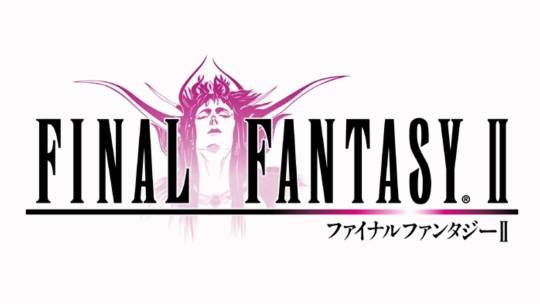
Year: 1988
Original Platform: Famicom
Also Available on: GameBoy Advance (Final Fantasy I &II: Dawn of Souls), PlayStation One (Final Fantasy Origins), PSP (Anniversary Edition), Android, iOS. Wii/3DS/Wii U Virtual Consoles and WonderSwan Color releases are only in Japan.
Version I Played: PSP
Synopsis:
Firion, Maria, Guy and Leon are recent orphans from Emperor Palamecia’s attack on the city of Fynn. They are picked up by Minwu, an agent of the rebellion against the Emperor led by Princess Hilda. The orphans wish to join the fight against the Emperor, and so Minwu helps them on missions to foil the Emperor’s plans.

Background:
So, here's where the history of Final Fantasy games gets a little choppy. Final Fantasy II was not initially released in the US, nor outside Japan for that matter. The reason was because the US localization was taking too long and the Super Nintendo was already being developed and on the verge of released. The same thing happened with Final Fantasy III. The US localization for both games were trashed in favor of working on Final Fantasy IV. Square released Final Fantasy IV as Final Fantasy II for Western audiences, so they wouldn't get confused. Final Fantasy V was also unreleased outside of Japan for other reasons, and so Final Fantasy VI became known to Western audiences as Final Fantasy III.
Then when Final Fantasy VII came around they said "Fuck it" and left it numbered like that for Western audiences too.
The real Final Fantasy II wasn't released to Western audiences until 2003 with Final Fantasy Origins for the Playstation One. The real Final Fantasy III wasn't released to Western audiences until the 2006 remake for the Nintendo DS. Final Fantasy V was first released outside Japan as part of the collection in Final Fantasy Anthology for Playstation One in 1999.
Gameplay:
Final Fantasy II is the black sheep of the series. Even though it sold well on its first release, it’s the lowest selling Final Fantasy game to date. This is in part to the gameplay, which sounds great on paper but doesn’t work out well in execution.
Instead of conventional leveling up - meaning you gain experience points (XP) and your stats rise - you raise your skills and stats based on how often you use them. Everybody has the ability to use any weapon or magic spell. But the more you use one certain weapon or certain spell, the more you level it up. For example, I could have Firion use a sword. The more often I make him use a sword, the greater his skill with a sword. If I give him an axe, he will start with a Level 1 axe ability, and not deal as much damage as he would with a sword.
The problems arise in matters of defense and HP. By that logic, the more you get hit, the more your HP grows. This is pretty infuriating because if you want to grind to raise your HP, you fall in danger of dying. To raise defense, you have to equip a shield and get hit. It also really sucks late in the game if you neglect one particular stat that becomes important.
By the time I reached the third act of this game, I was frankly fed up. I just had the sole purpose in mind of finishing the game. The frequent random encounters near the end infuriated me. Not that they were hard, but they used up my resources and I really wanted to end it once and for all.
However, the game has a nice feature where you can learn key terms and words when talking with people. This helps you remember what to do and where to go next. That part was cool.

Graphics:
Very little had changed between the first and second Final Fantasy games, as you can see.
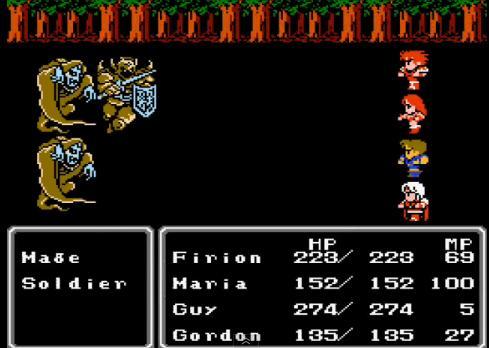
The same is true for the PSP Anniversary Edition.
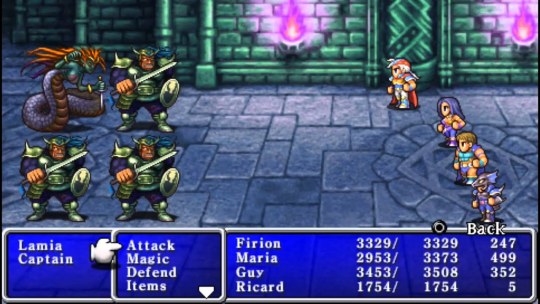
The graphics are exactly the same as that of Final Fantasy PSP Anniversary Edition. As such, they feel homogeneous and somewhat uninspired. Once again, they rip the opening FMV sequence from the Playstation One version. Why do they do that? Just give a little extra effort to make it unique. Just a little.
Story:
Final Fantasy II was the first story-driven RPG for the series. It introduced a lot of the trademark elements that the series is known for, like Cid and Chocobos, and so it’s a shame that it wasn't memorable.

Critics bash the story because they compare it to Star Wars from 1977. The plot is similar in that there is a rebellion against an empire and a princess who gets imprisoned inside the empire’s secret weapon of mass destruction. The Emperor even has a right-hand man clad head to toe in armor with a SECRET IDENTITY. While there is no Death Star in Final Fantasy II, there is a massive airship that the Emperor builds to crush the rebellion - the Dreadnought - and Princess Hilda, just like Leia, is taken prisoner there.

But in my opinion, plot parallels should really be the least of your worries. I think the story is a tad bit underrated. Just a tad. Well, the main characters are bland. Firion is a cool name. Other than that, there's nothing to say about them. They are less fleshed out than the secondary characters, which is ironic. I was more interested in any other character than the main cast. Guy (or Gus in some versions) is a stereotypical friendly giant, only saying short phrases or one-word answers. Firion and Maria don't really do much except want to fight for the rebellion. Leon has a story arc that's too quick and convenient.
The secondary characters that you run into are much more interesting – Josef, Minwu, Gordon, Ricard, Leila and Scott. They come and go during certain events and they all have even the slightest ounce of backstory more than the main characters.
The story tapers off after you rescue Princess Hilda. While I won’t spoil anything (though I doubt you’d care but still), there are stupid moments when the Emperor could have easily crushed the rebellion but instead chose a different route. Ultima, the ultimate spell, becomes an important plot device that the heroes seek – and yet it doesn’t end up being effective for the final battle nor is it mentioned again in the story. Overall, Final Fantasy II appears to be the Final Fantasy game with the most plotholes. The strongest part of the story lies in its secondary characters. The game left me wanting more of them instead of playing a group of stereotypical orphans without any personality.
Even though Final Fantasy II has an actual storyline, its predecessor feels much more original despite the fact that it’s more like a series of episodic events. Whether Star Wars was an intentional inspiration or not, it makes sense as a first jab at creating a storyline. It’s simple and tropey.
Music:
Despite Final Fantasy II lurking in the shadows for years, it has good music. The Rebel Army theme is great, especially when you hear it orchestrated in Final Fantasy medleys and the Distant Worlds concert. The final battle with the Emperor has the first true final battle music in the series, and it’s awesome. You can tell Uematsu had fun expanding his repertoire.
Like before, the PSP version adds more tracks and gives a more orchestrated feel.
Notable Theme:
As the chocobos debuted in this game, so did their theme song, which was quite repetitive here. In later games, Uematsu added another stanza of music.
youtube
Verdict:
Most likely the worst of the Final Fantasy games. You’re really not missing much if you never play it. It strikes a jarring note in both gameplay and story, like when you play the piano and keep hitting the wrong key.
The PSP version is probably slightly more interesting. Still, I wish they buffed up the story somehow. Why not remake the entire game? There is potential with the characters. Keep your basic elements but just make the story, you know, not boring and stupid.
Direct Sequel?
Yes. Final Fantasy I & II: Dawn of Souls introduced a second part to the story called Soul of Rebirth. The PSP version also has it. It's dumb. I tried it and for whatever reason it’s very difficult right away and so I lost interest entirely.

#final fantasy#final fantasy ii#firion#final fantasy maria#final fantasy minwu#minwu#final fantasy leon#final fantasy guy#final fantasy review#square enix#square#sony playstation#nes#famicom#video games#onvideogames
6 notes
·
View notes
Text
Final Fantasy II Labyrinth of Nightmares Part 2: Hunters of Transient Dreams, Chapter 5
“Maria!” Firion drew Maria to him, cradling her gently against his chest as if she were a small animal. She was so overcome with joy that the only thing Maria could do was sob out Firion’s name as he held her against him. Guy looked over the two of them, choking back on his own emotions as he bore witness to the gesture of genuine affection between two of his best friends. Hilda and Minwu allowed the three of them to regain their composure before debriefing them on their current circumstances.
Deist had been the first country Palamecia had struck. Due to its close ties with Fynn, the survivors of that initial onslaught had immediately rushed to the aid of Fynn and Hilda. Hilda had marshalled the remaining forces into a rebel army under her leadership and they had hunkered down under the partially standing remains of what had once been the Royal Palace of Deist. It was a location of strategic importance as Deist was on the southern tip of the continent and allowed the rebel army to spy on the movement of Palamecia forces.
Hilda had sent out a squad from this army to retrieve Gordon, and by extension, Firion and his friends.
Firion opened his mouth to express his gratitude for the Princess’ timely rescue. “Princess Hilda, you have --”
She cut him off before he could continue. “You should express your thanks towards Minwu, not myself. It was his skill with magic that allowed us to retrieve your wandering soul.”
Firion forced his attention to the man in white in the corner of the room. “Thank you, Minwu.”
Minwu nodded in return.
“That man...” Firion mused, thinking of his most recent opponent. “He was a mage too. But his magic was evil.”
“You are referring to Count Borghen? I’ve had several reports concerning him from several of our forces stationed around the world. But Firion…” Princess Hilda trailed off, her regal brow furrowed in thought.
“Yes?” Firion responded.
“This is something that goes beyond magic as we understand it.”
“Beyond magic?”
Hilda turned to Minwu, allowing him to take over the explanation from there.
Minwu began explaining to Firion about magic, something he had devoted his life to mastering. Magic was a power derived from God; it was supposed to be a power used for the benefit of mankind.
However certain parties had learned that if they approached that training with a specific, powerful force, the magic could be warped into something malignant.
Firion interrupted Minwu’s lecture. “What was this powerful force?”
Minwu took a moment to gather his thoughts before quietly answering Firion’s question. “To deny God is an act of intentional malice. It invites the eyes of the Devil, and allows one to gain access to evil, supernatural powers.”
“Evil, supernatural powers?” Firion exclaimed.
As Minwu’s words turned over in their heads, Firion, Maria and Guy thought about Leon and Elma. They had only indirectly seen signs of potential possession in Leon when they had come across the mutilated corpse of Leon’s beloved dog Perry. Elma, whom they had faced directly, had seemed possessed by something intent on taking Firion’s life.
“Could it…” Firion trailed off, trying to order his thoughts in a calm and rational manner. “I mean, surely the malice of one man couldn’t destroy the world so quickly? Or cruelly?”
“You are correct, Firion.” said Princess Hilda. “I cannot help but feel that Emperor Mateus is not our true enemy. That there is another, more powerful, force working in tandem with him.”
“But Princess Hilda,” Maria asked in the small voice that could have come from a child, “How can anyone beat that kind of power?”
Hilda shook her head. “I don’t know.” she said. She straightened,determination glinting through her eyes as she continued to speak. “I don’t know. But so many young people, from all over the world, are coming to me. I can’t let them down. I refuse to fail, even if I am the only one remaining able to fight.”
Maria felt a sudden kinship with this woman before her. Like Hilda, Maria had suffered loss when her parents had been ripped from her in an instance. It wasn’t quite the same as your romantic partner being stolen from you before you could even begin to enjoy marriage, but Maria’s womanly heart ached for the princess even so.
At that moment, Gordon entered the room in brisk indignation. His eyes briefly slid over Firion before blatantly ignoring him to turn his ire fully on the princess, making it clear that Firion,and his earlier interference, had offended Gordon.
“Hilda!” Gordon barked, marching directly in front of her.” Hilda, I demand an explanation. I’ve been informed that I have been removed from the battle corps. I am in perfect health. I have every intention of returning to the front lines immediately-”
Hilda cut him off with an imperious gesture of her hand. “You have proven yourself inept with command, Gordon,” she told him coldly. “I will not allow you to abuse the soldiers under my care any further. The front lines have suffered enough rescuing you from your own foolhardiness, and I will not reward that loyalty by allowing them to bear the consequences of your selfish behavior!”
“But…” Gordon retreated momentarily, the wind briefly taken out of his sails before his eyes lit back on Firion. It allowed him to gather the indignation to muster up a counter riposte to Hilda’s claims. “It was them!” He accused, pointing at where Firion, Maria and Guy had gathered around each other. “If they hadn’t interfered, I would have had Count Borghen! I was willing to die if it meant killing him as well!”
“Silence, Gordon.” Hilda ordered, regal grace adding power to her command. “The point in victory in battle is to live to see it through. There is no meaning in holding your life so cheaply. Accusing these people of interference when they were trying to save you is wrong.”
Hilda paused, looking at Gordon with implacable eyes. “I heard about Mai, Gordon.”
Gordon said nothing.
“I heard he loved you.”
Gordon stiffened at the observation, but continued to say nothing.
“I have been informed that he took a direct hit of cannon fire meant for you.”
Gordon continued to remain silent.
Hilda regarded Gordon before continuing in a tone of quiet finality. “You will not participate in any future battles, Gordon.”
Gordon immediately began to protest but it was clear that Hilda had no intentions on hearing him out. She bowed to Firion, Maria and Guy before exiting the room.
Prince Gordon stood there fuming after being lectured, and Firion struggled to find the words that wouldn’t offend the second son of the Kashuan Royal Family. After all, what sort of commiseration could a commoner offer in speaking to a prince? The effort was in vain; Gordon shot Firion a glare before turning on his heels and stalked out.
“You’re being rude, Your Highness!” Maria called out. Unlike Firion, she had no problem in speaking her mind.
“Maria!” Firion began to chide her, but faltered. After all, she had only said what he himself was already thinking.
“You’ll have to excuse him,” Minwu stated quietly from where he had stationed himself in the corner of the room. “Prince Gordon is desperate to earn forgiveness from Princess Hilda.”
“He is?” Firion asked, looking into the mage’s gentle eyes.
“When faced with the spectre of death for the first time, Prince Gordon was paralyzed by his fear and found himself unable to fight for home or freedom,” Minwu explained. The mage chose his words carefully, painting a picture of Gordon’s turmoil and grief. He had been in Fynn, celebrating the marriage of his brother to Hilda, when the dark clouds of Palamecia’s power grab had covered the world.
Gordon bore witness to his brother and his father taking up arms against an enemy too strong for them to obtain victory. His mother and her retinue were chased down and slaughtered for sport by enemies in thrall of their own capacity for violence. He heard Hilda’s pleas for help but bound by his own horror, Gordon was unable to breach his terror to bring himself to act.
By the time he was able to gain even a modicum of mastery over his fear, Gordon stood alone in a desolate wasteland.
“He abandoned his family to escape,” Firion fought to keep his tone free of any judgement, even as he felt his own anger rising at the evidence of the Prince’s cowardice.
“He didn’t have the strength to fight back,” Minwu emphasized. “Not then.”
The three of them turned Minwu’s words in their heads like it had been a solemn incantation.
“That’s why…” Firion didn’t finish his thought as he thought about Gordon’s compulsive drive to defeat Count Borghen at all costs if it meant that the rebel army would have gained significantly from such a victory. Gordon’s motivations were suddenly clear to all three youths.
“Do you think Princess Hilda is able to forgive Prince Gordon?” Maria asked Minwu.
Minwu did not give an answer; he hid his eyes underneath his white hood and it made his expression inscrutable. There was only silence, and the heavy air that had somehow become the new normal since the world went to war two months ago.
26 notes
·
View notes
Text
Final Fantasy II: Memory of Heroes novel differences
I’ve done I and III (though the latter may need a touch-up later). Might as well do II as well.
Compared to the other two adaptations, II sticks more closely to the actual plot. There’s still some differences, though.
- The adaptation starts with Firion being resurrected, although he has a flashback to what happened: The party flees, Leon realizes that fleeing is hopeless and turns to fight, Firion joins him while Guy protects Maria. Firion falls just as Guy has his back slashed open and the last thing he hears is Leon giving a war cry, with the implication that Maria was attacked.
- We’re given a smidge of background on the orphans in this version: Rather than in Fynn proper, their hometown is a village on the border of it, they’re explicitly mentioned to have lost their parents in a fire, their father tells Firion to take care of his siblings, and the four apparently imagined themselves as rebels, which they reflected on with shame after they were forced out of their home.
- Firion is furious and wants revenge when he asks to join the rebels.
- The task of infiltrating Fynn is recognized by Firion as a test of their self-control. Maria almost tries asking a couple in a house about the man taken to the tavern, but Firion and Guy hold her back.
- While accompanying Firion’s party, Minwu mentors them in a number of ways. When Firion brings up Gordon, Minwu states that he needs the strength to stand on his own and that Firion’s party is more likely to help with that.
- Cid is a lot more jovial and less gruff here.
- Josef is far ruder in his initial interaction with the party. He doesn’t even tell them what’s wrong directly: He covertly shoves a map of the Mythril Mines at the party before forcing them out the door. It’s only after they go there that they start figuring out what’s happening.
- Also, Minwu believes Josef strong enough to have handled the imperial forces himself (of course, then they learn Nelly was kidnapped).
- The commander is far less impressive here: The text notes that the cavern is decorated in a ‘desperate’ attempt at making the cavern luxurious and Minwu makes a plan that catches the imperials completely off-guard.
- For the plan to destroy the Dreadnaught, Minwu gives Firion the leadership role.
- Upon learning that Borghen is overseeing development of the Dreadnaught, Firion considers straight up ending him right then and there, before deciding that, with how work on the Dreadnaught’s going, he’s harmless. Then they find the Dreadnaught done ahead of schedule and Firion curses that they should’ve done it.
- Firion actually fights the Dark Knight (who roasts him for his poor on-the-fly plan) where the first clue of his true identity pops up: The Dark Knight is described as having a unique, self-taught style (which he uses to disarm Firion quickly) and that it’s one Firion recognizes Leon.
- The Sunflame quest is totally different:
-- Gordon joins the party as they leave Fynn
-- The Sunflame takes the Goddess Bell’s place at the bottom of the Snow Cavern. Gordon already has Egil’s Torch
-- Gordon is captured by Borghen towards the end of the cavern. Borghen himself makes no mention of being executed by the Empror for failing, instead focusing on his glory and legacy as well as reclaiming his status as a general.
-- On a related note: the game is a bit ambiguous regarding Borghen’s feelings towards Leon the Dark Knight. Here, he’s explicitly dismissive of him.
-- Gordon ends up throwing the torch, causing Borghen to hesitate long enough for Maria and Josef to take him out (Firion catches the torch).
-- Borghen’s trap isn’t just a boulder, but to cause the cavern to collapse. Josef holds up the roof long enough for the others to escape, but ends up crushed afterwards. Gordon naturally feels guilty, but Firion does too for not killing Borghen back in Bafsk.
-- Nelly is portrayed as mature for her age, which shows in the scene where she tells the heroes to keep fighting, hiding her sorrow until her last line of asking them to do it for Josef.
-- Also, the woman outside of Josef’s house doesn’t exist in this version of the story.
- The scene where the party rides chocobos to chase after the Dreadnaught is the only time Guy’s affinity with animals comes up, I believe. The novel also states that Chocobos have a strong homing instinct, explaining why they flee as soon as the riders get off.
- While the game glosses over the realization for simple foreshadowing, here the party actually realizes that Leon is the Dark Knight when he confronts them in the engine room. As a result, the party considers whether or not Leon is brainwashed and Firion wonders if he’ll be able to fight him.
- The Lamia sequence is heavily toned down 0/10 worst adaptation ever: Hilda’s eccentric behavior is replaced with her acting shell-shocked and the seduction sequence doesn’t happen. Instead, when Firion tries to ask her to lead again, she dismisses his concerns as trivial before telling him to come closer.
- Firion actually does almost get killed by the Lamia before Maria and Guy barge in and the former shoots it, giving Firion a chance to finish it off. Maria then chastises Firion for being so careless.
- The party fights the Behemoth, Maria using magic while Firion and Guy use physical strength. When Guy gets knocked aside, Gordon takes the opportunity to stab it in the threat, with Firion adding his own sword to the forehead.
- The Emperor has a jester in this adaptation and he’s present for the arena sequence. When the Emperor turns out to be an illusion, it’s due to the Jester’s influence. On that note, the Dark Knight is absent in this sequence; the party falls for a trap door.
- The recapture of Fynn happens offscreen. We do get Hilda give a speech to the worried populace, though.
- I neglected to mention this earlier, as you may have noticed, but Leila has the dubious honor of being the only guest party member to not appear in this adaptation 0/10 worst adaptation ever. She’s replaced in the Mysidian Tower trip by a generic male captain and she’s not present for the earlier shenanigans like the Lamia. This has the added effect of making Gordon the only guest (not counting the replacement captain whose fate after Ricard leaves is ambiguous) to survive to the end of the story.
- Ricard’s a bit more playful here, at least until he learns that the Dragoons were wiped out by the Empire from the captain. The revelation that they were all poisoned, and he was stuck in Leviathan, causing him to lose it and become desperate to escape. In the end, the group use gunpowder to cause Leviathan to spit them back out.
- The four crystals in Ultima’s chamber in the Mysidian Tower are woven into the plot: Namely, they’re II’s equivalent of the elemental crystals (which the game itself hints at) much like I and III. While they aren’t explicitly called such, the crystals stressing that darkness is spreading over the world, that the world cannot exist without Light and telling the Warriors to “bring Light to all” along with blessing them with their powers and the four feeling Light within them..., the four are made Warriors of Light in all but name.
- Deist happens off-screen. Ricard leaves the group after the Crystals’ blessing to see Deist for himself and returns with the Wyvern. He mentions Elina and Kain as he explains what he found at Deist.
- The Emperor initially uses another illusion on the throne in the Cyclone, but this time Maria grows wise and snipes the jester making the illusions. The Emperor himself then appears behind the party.
- The Emperor uses explosive and, interestingly, light magic. Firion is forced to shield Maria to give her a chance to cast Ultima, giving Ricard a chance to leap at the Emperor. Emperor parries the leap, but his scepter gets destroyed, which lets Firion and Guy end the battle.
- Also a neat little detail: The Emperor is shocked to see one of the Dragoons alive.
- Unlike the game, Firion and co. don’t forget about the Dark Knight and even note his odd absence. Then the news comes...
- Cid is never explicitly said to die, although with the shape he’s in, it’s probably pretty obvious.
- I made a post about Leon’s speech earlier. The general gist is that the speech is expanded, with Leon feeling that the only way to get out of the cycle of oppression is to stand at the apex of power. Firion notes that Leon used to believe that power should be to protect the weak and Leon claims to have discovered the limits of that approach.
- The Emperor emerges from Leon’s shadow (It’s symbolic). The novel also gives something of an explanation for Leon losing his helmet: The Emperor shatters it when he whacks him on the head. Interestingly, while the “there’s only room for one Emperor” line is there, the part about wanting to destroy everything isn’t.
- Ricard implores Leon to reconsider his path and transfers his Light over to him. The Light ends up being a factor in Leon turning face.
- The Jade Passage and most of Pandemonium is skipped: Leon aims the airship down what may as well be the passage and guns the engine. He winds up crashing the airship into Pandemonium’s top floor, with it stopping in the throne room.
- While I haven’t mentioned it until now, Hell in this adaptation is consistently referred to as “The Underworld”. Not sure why, as the characters say stuff like “Damn” elsewhere.
- The Emperor actually calls out Leon for siding with the heroes after just recently trying to kill them. Leon shoots back that he’ll do anything to protect the world from the Emperor.
- As the Emperor is on the verge of losing, he has a breakdown only to save face when he notices the Warriors’ light. The party reaffirms that they’re not just doing it because it’s their job to stop the darkness, but that they’re doing it for all those who have died and for those who are left to have a better future, etc.
- While Maria tries to stop Leon from leaving, Firion has the feeling that they’ll see him again someday. Leon himself feels a similar way, but blames it on the light Ricard passed on to him before leaving on his own adventure.
- BONUS: The ending of the FFI adaptation implies that the Warriors of Light reincarnate across all three stories. This would generally mean
Firion = Setro (is the leader, although with growing pains and self-doubt, and is very hot-blooded here. Also uses himself as a human shield at one point like Setro and Luneth)
Maria = Flora (Maria does get tutored by Minwu, which is a factor in her wielding Ultima, a spell classified as White Magic in FFII)
Guy = Teol (Arguably the weakest connection of the four; Guy uses his physical strength leaving Maria as the sole magic user, and him being good with animals is only mentioned briefly. Him being quiet and dependable is probably the only consistency between the two)
Ricard/Leon = Zauver (A bit hard to spot given that both only appear towards the end of the story, but Ricard is portrayed in a more playful nature and, like Minwu and Gordon, they both act as the number 2 to Firion. Leon also acts a bit more rational than Firion towards the end of the story (though that’s partially because he actually knows where Pandemonium is rather than being fooled by the projection) and he pilots the airship to the underworld. That said, the mention of Ricard’s Light influencing Leon makes it very obvious as well).
#Final Fantasy#Memory of Heroes#Final Fantasy II#Final Fantasy 2#FFII#FF2#Firion#Maria#Guy#Leon#Minwu#Gordon#Josef#Ricard#The Emperor#Emperor Mateus#Emperor Palamecia
10 notes
·
View notes
Text
Final Fantasy II review
One of the most interesting parts of the Final Fantasy series, and a big reason why I’m so fond of it, is that every main series game takes its own approach to the gameplay. From the job systems of III and V, the Materia system of VII, the Junctioning system of VIII, or the straight up action combat of XV, every game has a different focus that makes them stand out, and while the results can certainly fall short at times, it’s still something worth commending. For example, take the subject of today’s review, Final Fantasy II. For the second game in the series, and a game that came out in 1988, it’s a huge step up from the original game in a lot of ways. A much more detailed plot, containing several defined playable and supporting characters, a much more experimental battle system, the introduction of many elements, gameplay and otherwise, that would establish a true identity for the series, away from just being a ripoff of Dungeons & Dragons 1st edition, it’s an impressive and critical step forward for the series. Unfortunately for the game, it hasn’t been 1988 in over 30 years, and it’s now easily the weakest game in the series in my opinion. As for why that is, well, that’s what we’re taking a look at today. As with the first game, I’m reviewing the PSP version. Note I’ll be pretty lax with spoilers, so take caution, if you actually care to avoid spoilers.
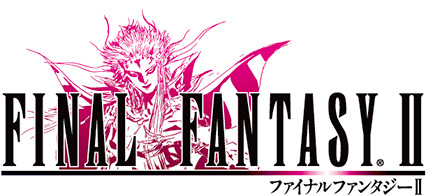
Story:
Final Fantasy II takes place in an entirely different world than Final Fantasy I, a tradition that every main series game would follow. The peace of this world is shattered after the rise of Emperor Mateus of Palamecia, who, bent on world domination, raises a fearsome army and unleashes the denizens of Hell upon the land, conquering a large portion of the world. The city of Fynn organizes a large resistance effort, only to be attacked by the Emperor’s army, forcing a small remnant to flee to the town of Altair, establishing the Wild Rose Rebellion, led by Princess Hilda. During the fall of Fynn, four youths, Firion, Maria, Guy, and Leon, attempted to escape as well, only to be attacked and left for dead by the Emperor’s soldiers, with Leon going missing as well. Rescued by the rebellion, and healed by the white wizard Minwu, Firion, Maria, and Guy, having nothing left to return to, and wishing to search for the missing Leon, join the rebellion to fight back against Palamecia. Meanwhile, the Emperor, his army having taken heavy losses taking Fynn, takes to devising much less conventional methods of establishing his rule, starting with a massive airship called the Dreadnought, meant to scare the populace into obedience, on threat of total destruction.
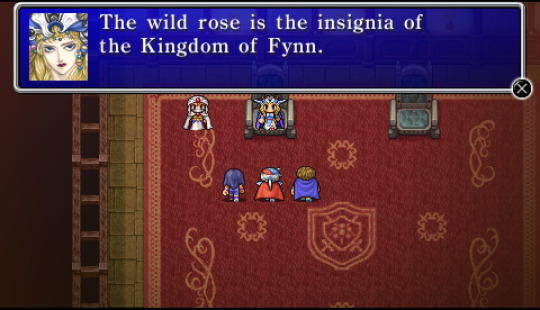
Compared to the very light plot of Final Fantasy I, the story here is much more involved. Instead of wandering between locations more or less aimlessly, there’s always an explicit plot reason to go to new locations, the party being given tasks like finding mythril to supply the rebellion with better equipment, or trying to recruit potential allies. Compared to the party in the first game just being completely blank slates, the party consists of the more distinctive Firion, Maria, and Guy, with the fourth slot being filled by various guest characters that come and go as the story goes on, such as Gordon, the prince of the fallen kingdom of Kashuan, and Ricard Highwind, the last of the dragoons, and there’s actually an established side cast, including characters like Hilda, the leader of the rebellion and princess of Fynn, Paul, a noble thief assisting the rebellion, and Cid, a former knight who maintains the world’s only airship, with this notably being Cid’s first appearance in the series.
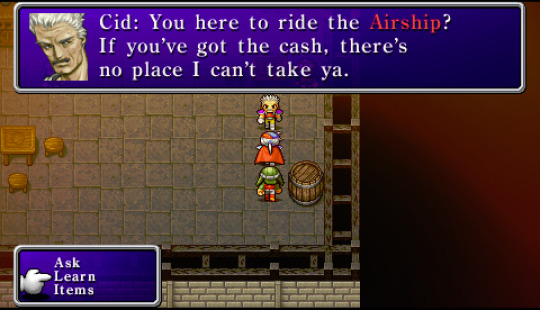
Final Fantasy II is also very noticeably darker than the first game. While the plot circumstances of the first game weren’t exactly cheerful, with the world falling apart due to the influence of the Fiends, outside of a select few towns, this wasn’t very obvious, and the game overall carried a bright, adventurous feel. Not so with Final Fantasy II, where the Emperor is a much more prominent and ruthless villain who’s already conquered or ruined a majority of the world, always keeping another plan on standby, and staying one step ahead of the heroes. Many characters die over the story, from random NPCs to even temporary party members, and the game overall carries a prominent melancholic, empty feel to it, one that’s very impressive considering the time it was made.
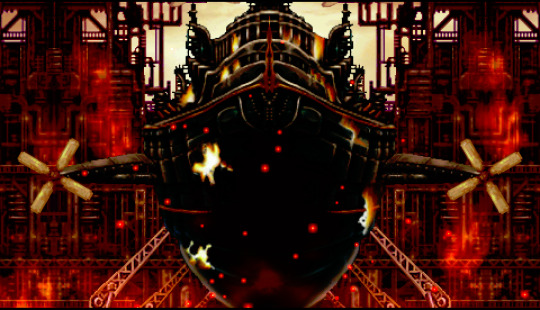
To be honest, however, it actually goes a bit too far in this regard. Almost everything the protagonists accomplish comes at the cost of allies dying, or something preventing them from fully completing their mission. Many NPCs are pessimistic about the chances of humanity being able to win against the Emperor, and so much destruction is wrought upon the world by the end that it seems there’s not even much left to save. From the very beginning of the game, which starts with your party instantly being destroyed in an unwinnable battle, the game is nothing but a constant stream of death and hollow victories, with plenty of characters you can find mourning their losses, and there’s very, very few points in the story that offer any sort of relief from it. Combined with the Emperor barely seeming bothered by anything the party accomplishes, and running circles around them more than a few times, it’s very easy to simply lose any investment in the story.
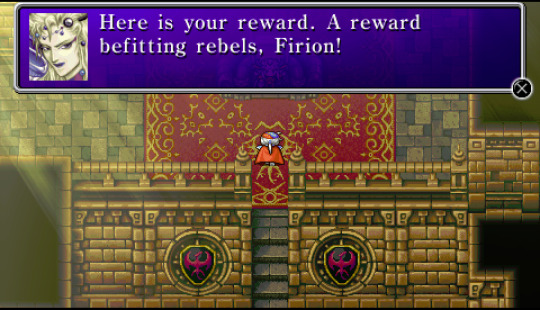
The characters unfortunately only add to this lack of investment. It’s hard to hold it against the game, but the main party of Firion, Maria, and Guy is still easily the least developed cast in the series. They have little dialogue to themselves to begin with, and have very minimal personality traits, especially Firion, who pretty much only exists to be the hero by default. Additionally, whereas in most RPGs, the cast’s varying personalities and skills tend to gain importance, here, the only skill any of them have is Guy being able to talk to beavers, which only comes up once in a way that doesn’t even affect the story, and, again, they have nearly no personality otherwise, which totals out to each of them having, at best, 1 moment each throughout the story where they’re not completely interchangeable with each other, which barely elevates them above the completely blank slate party of FF1.
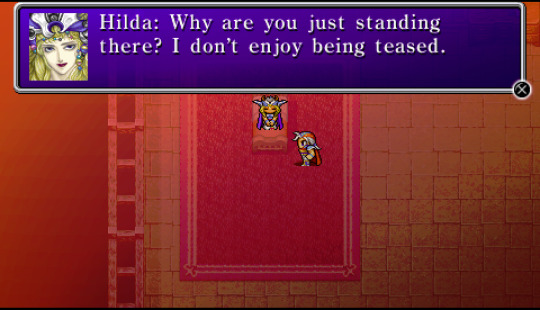
The guest party members and NPCs fair a bit better, but not by much. The guests tend to be at least mildly interesting, like the fatalistic Minwu, the cowardly Gordon, who learns to be courageous as the story goes on, to the pirate girl Leila, but they’re still nothing special, and there’s surprisingly few other NPCs, most of which aren’t too memorable either. Even the Emperor himself is about one of the most stereotypical evil emperor characters you could have, not helped by the very few scenes he gets. That’s not to say he’s a bad villain, though. His successfulness does create a presence that looms over the entire story, and he pulls off one of the coolest plot twists in the series; after being killed by the party in a very easy battle late in the game, he simply returns as a demon himself, having become far, far stronger than he had ever been in life, to the point of taking over Hell itself. It’s such a unique and unexpected twist on the seemingly weak political villain that it alone cements the Emperor as one of the more memorable villains in the series. Overall, while the writing of the game is quite impressive for the time, and laid a good deal of groundwork for the improved writing of future entries, it’s just passable at best nowadays.
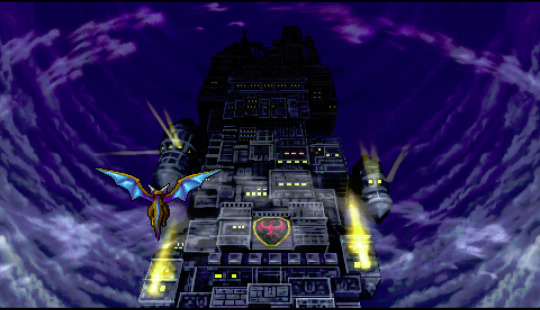
Gameplay:
Here’s where things really start falling apart. On the surface, not much the combat doesn’t seem terribly different from Final Fantasy I, with it still being a standard turn based system with basic commands like attacking, using magic, and defending. The big differences in Final Fantasy II’s combat lie in the character progression. The first game had you simply selecting a party of 4 classes at the start of the game, gradually making them stronger across the game by leveling them up and acquiring specific equipment and spells for each, like pretty much every normal JRPG. FF2, on the other hand, uses a much more complex system. Every party member is capable of using every weapon and learning every spell, in the process abandoning the D&D system of set spell charges and instead introducing the traditional MP system, and characters are not set in specialized classes and roles. Instead, FF2 discards the usual EXP based leveling system, and instead uses a stat leveling system, where the individual stats of each character level up separately depending on the course of battle, and while each character starts with predetermined stats that favor a particular role for them, with enough grinding, you can still reshape them however you wish. This stat growth system would later be used and refined for the SaGa series, and it’s a very ambitious attempt at improving upon the party building system the first game established.
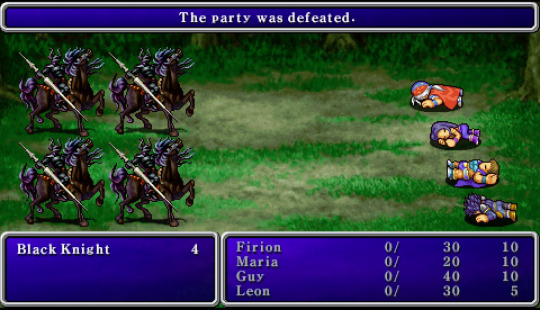
In total, there are 12 main stats that can be increased through battle: HP, your health points, which is raised in regular intervals, or losing HP in battle, MP, magic points that allow you to use spells, which is raised by having MP reduced in battle, Strength, which determines your physical attack, and is raised by using the attack command, Magic, which determines how much MP you get when it is gained, and is raised by having MP reduced in battle, Spirit, which determines the strength of white magic spells, and is raised by casting white magic in battle, Intelligence, which determines the strength of black magic spells, and is raised casting black magic in battle, Stamina, which determines how much HP you get when it is gained, and is increased by losing HP in battle, Evasion, which determines how likely a character can dodge physical attacks, and is raised by being targeted by attacks in battle, Agility, which factors into evasion calculation, and is raised by having high evasion, and Magic Defense, which determines how resilient a character is to offensive magic, and is raised by being targeted by offensive magic in battle.
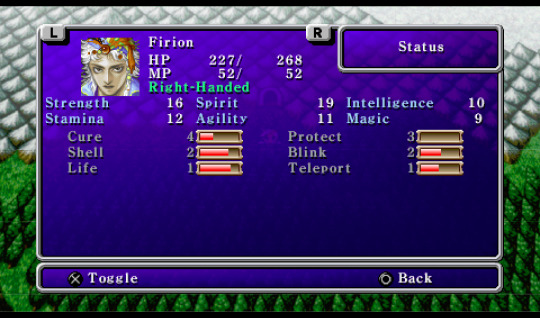
However, it doesn’t stop there, as individual weapon types and spells also have levels that can be raised, which is done so by gaining skill points in them by attacking or casting them during battle. Once enough skill points are gained, they advance to the next level, with the hard cap being 16. Gaining weapon levels allows that character to be more accurate and attack more times at once with that type of weapon, and raising spell levels increases their power and makes them more accurate. Each weapon type, consisting of swords, spears, axes, staves, knives, bows, shields, and unarmed, have different attributes, such as spears being a relatively balanced type, with lower individual power than swords and axes, but higher accuracy, while bows are allow characters to attack from the newly introduced back row, which makes them immune to physical attacks, but prevents them from attacking with any other weapon type. While focusing on one weapon type with each character would seem the most efficient, the game only tends to give you one or two weapons of each type at a time, many of which have good boosts in power or added effects, making focusing on a few different types a decent idea.
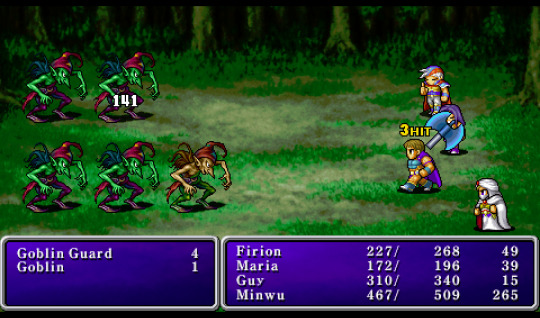
Shields are unique in that, while equipping them doesn’t raise your defense as might be expected, and actually lower your attack, they give large evasion bonuses that makes dodging attacks much easier, and have the chance of blocking a physical attack completely even if something does connect, all of which increases as you gain levels in it. As for other defensive equipment, you have heavy and light types of armor, with light armor giving less defense bonuses than their heavier counterparts, but not weighing nearly as much, and thus leaving you much more evade. As for spells, they start out very underpowered, and have awful accuracy in the case of buff and debuff spells, but become much more effective after a few levels, with the downside of them costing more MP to cast with each level gained. Characters can learn up to 16 spells, and are free to remove them at any time, at the cost of having to level them again from scratch if they ever relearn them. Instead of simply learn spells by buying them in towns, spells are instead learned from tomes, which can be bought from shops, found in treasure chests, or dropped from enemies. Using them on the field teaches a character that spell, while using the tomes in battle instead casts a high level version of the spell, at the cost of losing that tome.
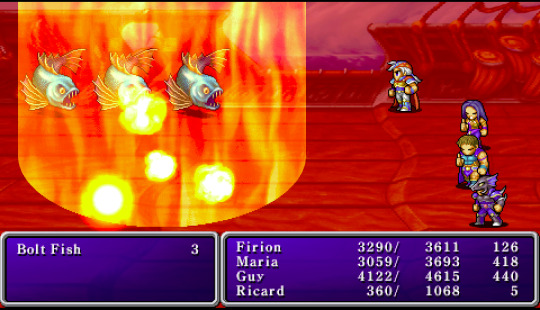
Unfortunately, as creative as this all is, this system has some serious issues. The main one, which you have already guessed, is that the game is incredibly, incredibly grindy because of these mechanics, and in a much worse way than most other RPGs. While not every stat is going to be important for each character, depending on how you build them, there’s still a lot of things it forces you to keep track of. Even if you want to make a dedicated mage, sticking in the back row with a bow for the whole game will leave them with so little vitality and HP that they’ll just be uncomfortably fragile, and with the magic attacks enemies have by the endgame, you really want to keep them in the front row for a good part of the game. Most spells, including important ones like Life and Esuna, for reviving party members and removing status effects respectively, while extremely useful, have such horrible accuracy to start that they’re completely useless before you level them up, and the weapon distribution is quite unbalanced, with swords having easily the best selection even in the midgame, essentially leaving most other types as stopgaps.
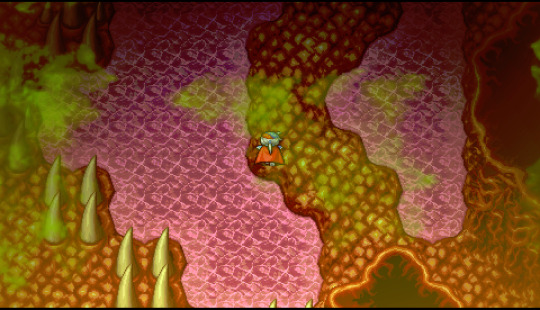
While you might level your important stats a good bit just naturally going through areas, trying to deliberately level any of them is a commitment. While HP, strength, spirit, intelligence, and magic defense tend to come easily enough, increasing stamina often only happens through the loss of a large chunk of their maximum HP, which, obviously, preferably doesn’t happen on a regular basis. This goes likewise for MP and magic, which is rather irritating, as not only do you need more and more MP as your spells level up, but ways to restore MP are extremely limited and costly. The bizarre loop of agility factoring in to evasion increasing, while itself only leveling up based on your current evasion, means that the only reliable way of increasing either is to equip the lightest equipment you have. While leveling up weapon levels is easy enough, especially since you can dual wield different types at once, leveling up spells is a much slower process, with casting low level spells during random encounters, even those that won’t actually help at the moment, often being one of the only feasible ways to get them leveled quick. You may even be tempted to ignore magic beyond simple spells like Cure because of the individual effort needed, but the game will quickly hammer the importance of magic into you; from the randomly encountered flans and bombs that either have absurd physical defense or tend to explode if not fully defeated in one turn, with magic being the only reasonable way to take them out, to mandatory bosses that hit quite hard, and also have enough physical defense to make physical attacks nearly worthless without absurd grinding, you’re not getting through the early game without dedicating some time to magic. On the flip side, another early dungeon has a boss that outright absorbs magic, making physical attacks the only way to beat it.
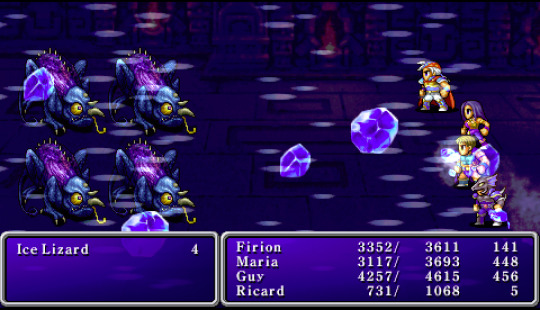
The game has quite a reputation for being brutal, and it’s not inaccurate, with most dungeons being more than glad to beat you down without remorse, and there’s tons of troublesome enemies to be found throughout the game, doubly so if you try to go for all the treasure chests in the area, as many of them are guarded by encounters called monster-in-a-box, which are often much more powerful than other encounters around. Most bosses are more than happy to make your life miserable too, especially the infamous Lamia Queen and Behemoth. However, this difficulty is in no way fair or well designed. While the growth system can easily leave you unsure as to whether or not you’re prepared for a dungeon, since you have no easy guideline to go off of compared to standard leveling, that’s not even the worst of it. The design of the dungeons, and even the world map, are horrible. There’s tons of doors scattered throughout pretty much every dungeon, and 90% of them lead to dead end rooms with raised encounter rates. There is absolutely no way to tell which doors are dead ends and which are necessary to progress, so you’re reduced to trial and error, which is extremely exhausting when there’s so many doors per dungeon, and you’re almost guaranteed to get into an encounter before you can leave each one, and if you’re tempted to ignore any doors when they don’t seem mandatory to progress, in many of those cases, there’s treasure rooms hidden among them, once again with no way to figure out other than guessing.
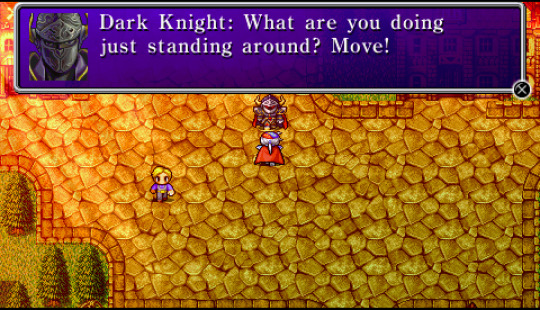
The world map, on the other hand, is one of the best arguments against open ended world design there is. Compared to the first game, there are almost no physical obstacles barring where you can go, other than a few rivers that are only crossable by canoe, something you get almost immediately, and a few areas only accessible by boat. Instead, you’re kept out of where you’re not supposed to be through the Dragon Quest 1 method of having the random encounters kill you horribly. The problems with this method are twofold: not only are the borders between where you’re supposed to be and where you’re not very thin, to the point of running into late game enemies just outside of the first town if you go just a biiit too far to the left, compared to Dragon Quest 1 often using bridges as visible borders between areas, but it just doesn’t really fit with how the game is designed. Dragon Quest 1′s pacing is rather relaxed, as while you do have plot objectives, the game doesn’t rush you to fulfill them. You’re meant to just hang around the areas you can survive in, grinding your way up and getting whatever equipment you need until you feel confident to move onto whichever area seems to be designed for next. In Final Fantasy II, you’re constantly being sent back and forth between areas to get new orders or do whatever the plot wants of you at that moment, but while the game loves telling where to go, it’s pretty bad at telling you how to get there, with its often vague directions being spread out between NPCs in multiple towns, to boot. While there is a map of the overworld you can access, it can still get pretty annoying having to meticulously check where you’re going, and you’re still liable to being decimated just because you wandered into a harmless seeming area. One nasty example comes after completing Kashuon Keep, not too far into the game. You’re expected to head back to Altair, which is on the other side of the world and is quite a bit of a walk, but heading south soon loops back to the Altair area, making for a much shorter walk. Trying to put this idea into practice, however, sends you across the large Palamecian desert, full of enemies more than eager to tell you that this area is still a few dungeons away from being accessed. It’s not completely unsurvivable, and can be safely traversed by finding the nearby hidden Chocobo, but it’s still a nasty situation after a very irritating dungeon.
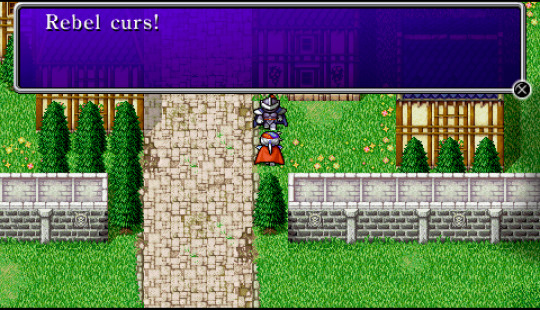
The biggest, and most frustrating, source of difficulty, however, is that the game stubbornly refuses to tell you anything about what’s going on behind the scenes. There’s so many mechanics left unexplained that cause a lot of difficulty if you don’t understand them. For example, every enemy has a stat called rank, which determines how many skill points for your weapons and magic you’ll actually get by using them on said foes. Essentially, if your weapon or magic levels are higher than the enemy’s rank, you need to use that weapon or spell more times in that battle based on the difference between the numbers to actually get any skill points. Not an unreasonable system, and you can view every enemy’s rank in the bestiary, but the game never directly addresses this, and even the most powerful enemies only go up to rank 10, effectively softcapping your skills and spells at 10, which often leads into having your party attack each other to bypass the entire mechanic, a depressingly efficient solution most of the time. Other stats the game never cares to explain are evasion and magic defense, which both display both numbers and percentages. For evasion, the number represents the number of attacks that character is capable of dodging, as physical attacks strike multiple times per round, and the likeliness of evading each attack. With magic defense, the number represents the number of attempts at avoiding a status effect can be made, and the percentage represents the chance of successfully doing so. Despite the name, the stat does not reduce damage taken from magic attacks.
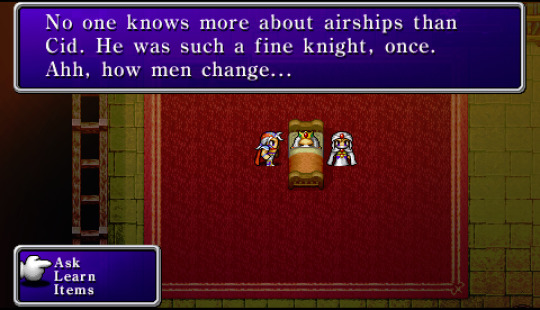
On the subject of magic, the spells available to you are also plagued with unneeded complexity and vagueness. First off, the descriptions for many spells tend to only give you the barest idea of what they actually do; Aura “Enhances effectiveness against various foes.” It never tells you what enemy types count, or that it only becomes effective against certain types as its level increases, you just have to hope that it’s working whenever you use it. Barrier “Raises a barrier to defend against special attacks.”, again giving you no indication as to what it’s actually protecting against. Shell and Wall both claim to raise magic defense, but give no obvious indication how they’re actually different from each other, and Dispel claims to remove protective magical barriers, which lowers the target’s magic defense, even though you may infer that it removes buffs, like in later games. Other spells tend to be redundant or very situational. Basuna removes temporary status effects, compared to Esuna removing permanent status effects, which is near worthless since not only do temporary effects wear off after a number of turns, but they go away after battle regardless, and are rarely effective enough to waste a turn removing. Fear increases the likelyhood of enemies fleeing battle, which is not only rare to actually work, but is worthless, since you don’t get any credit for defeating any enemies that do flee. Sap reduces the MP of the target, which is not only rarely likely to work, but counterintuitive if you have the infamous Osmose spell, which saps large amounts of MP while restoring the same amount for the user. Status effects also have different elements to them, namely body, mind, and matter, with most enemies having different resistances. Some spells, like Stop and Paralysis, have the same effect, but different elements, and keeping track is both difficult, both remembering which spell is which element, and what enemies are actually affected by each element, and nearly pointless, since the effects are rarely worth bothering with in favor of just attacking. Matter elemental spells, however, are rarely resisted by most enemies, even bosses, and mostly comprise of instant death spells like Mini, Break, Teleport, and most infamously, Toad. Not only does this game make instant death spells effective, it makes them downright overpowered, with almost every encounter being capable of being solved through judicious application of Toad.
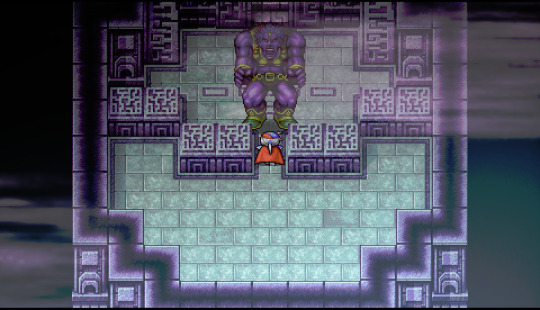
But the peak of all this is a special property that some enemies, like ghosts and the final boss, have applied to their physical attacks: a draining effect that not only restores their HP by the amount of damage inflicted, but specifically inflicts 1/16th of the target’s maximum HP per hit, with them eventually attacking 8 times per turn by the final dungeon. To sum this up simply, this makes heavier equipment worse than worthless. Not only will the defensive power do nothing to protect from this damage, but it actively weighs you down and destroys your evasion, guaranteeing you’ll take all those possible hits unless your did some extreme evasion grinding. You’d be protected better by not wearing anything at all, because at least then you’ll make use of all your natural evasion. Unless you want to constantly heal your characters for half their health everytime you run into specific encounters, you have to dedicate a lot of your time, or most of your run through the game, to getting their evasion leveled enough that this isn’t a problem. Knowing this can be the difference between fruitlessly blowing all your resources and breezing through effortlessly, and there is a certain weapon, the Blood Sword, that has this same draining effect, which can singlehandedly annihilate the final boss once you’ve figured this out. While there’s a few other smaller issues, like several encounter formations that cannot be ran from for no apparent reason, other than possibly being formations used in certain monster-in-a-box encounters, those are the main issues, and being aware of them, and having the information to circumvent them, makes the game much, much easier. If anything, it makes the game extremely breakable. From physical attackers that dodge everything thrown at them, to spellcasters that can wipe out encounters with a single cast, it doesn’t take much to erase the difficulty once you know what you’re doing.
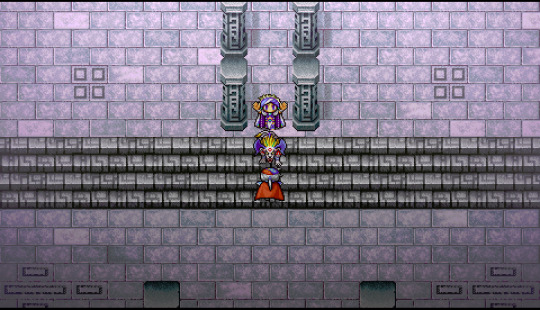
As for bonus content, there’s Soul of Rebirth, a bonus mode unlocked after completing the main game, first added in the GBA version, which focuses on several characters who die in the course of the story finding themselves in what they think is the Jade Passage, the path to Hell. While a cool concept that has a really neat final boss of its own, namely the light side of the Emperor, who split off from his dark half after death and instead took over Heaven, it still has issues of its own, namely that most of the party are guest characters in the main game, and carry over the stats, equipment, and spells they had when they left the party, meaning if you didn’t bother training them and stripped them of all equipment before they departed, you’re in an absurd time. The mode is also quite short, and only consists of two dungeons that are just mirrored versions of the final two dungeons of the main game and a town. A neat addition, but not much more than that. Other than that, the only optional content to find in the main game is the Arcane Labyrinth, a bonus dungeon added specifically for the PSP release. The game uses a keyword system where you can learn important terms from NPCs, and ask about those terms to get directions or a bit more plot. It’s sort of neat in concept, but in practice it doesn’t amount to much other than make it slightly more annoying to find out what to do, especially if you manage to miss a keyword. The Arcane Labyrinth, however, revolves around its use. In order to progress past the entrance, you must select a keyword at the portal to the next floor, which then takes you to a specific floor based around the keyword you chose. Almost every floor has a little sidequest to solve, like defeating specific enemies or giving items to NPCs, which give you new keywords exclusive to the labyrinth, or hints for some of the trickier floors. While they can be kinda annoying to do, you only ever have to complete them once for their reward, and can otherwise run straight to the exit on subsequent visits.
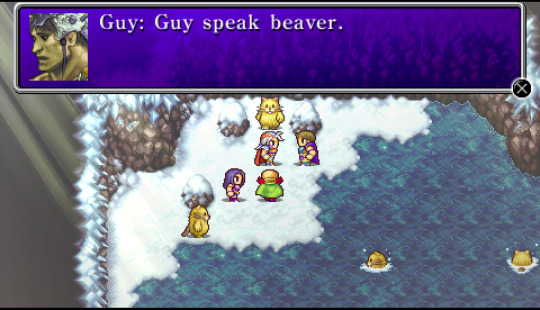
Every floor requires you to select keywords for the next, with 45 different floors being available in total, and the Arcane Labyrinth is actually split into 3 sections, with the northwest section requiring four floors to be visited, the northeast seven floors, and the south ten floors, though while you can’t visit the same floor twice in the same section, you can choose repeats in separate sections. There is much more strategy than simply randomly selecting floors, however. Each keyword belongs to a different category, which cause different reactions depending on your next choice. Picking keywords in the same category in a row cause better treasure to spawn and lower the encounter rate, while picking something in a category that opposes it, such as a matter and materials floor after going through a magic and spirits floor, has the opposite effect. Even more importantly, each playable character has a set of keywords that resonate with them, to varying degrees. This becomes important after finishing all three sections, which unlocks the Arcane Sanctuary. Within is Deumion, the master of the Labyrinth, who summons a superboss, Phrekyos, to test you, with its strength varying depending on how many keywords you’ve gotten through the story, making it beatable even in earlier parts of the game. Beating Phrekyos allows you to get a reward from Deumion; if you picked enough keywords that resonate with a certain party member, you will be able to get their ultimate weapon, which not only have tons of power, but confer massive stat boosts when equipped. If your keywords didn’t resonate enough, you only get an elixir, something that you can buy, albeit with absurd amounts of money. The optimal keywords for the main party are only unlocked in the endgame, but it can actually be worth visiting early for the party members that are used in Soul of Rebirth, as the weapons make it much more manageable, though visiting too early can end with you being much too powerful compared to how you should be. A special set of keywords also allow you to see Deumion’s past, leaving you able to either peacefully receive from him the Revive spell, or fight him as the ultimate superboss for the Destroy spell. Both are disgustingly impractical, but it’s a neat idea nonetheless. Overall, the Arcane Labyrinth, though still rife with its own set of frustrations, is actually one of the more enjoyable bonus dungeons I’ve come across, with a very creative concept that actually leaves you curious as to what the next floor could hold.
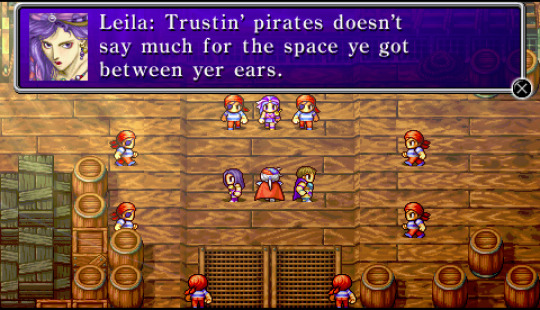
Overall, while the gameplay of Final Fantasy II has some interesting ideas, it’s held back by an irritating lack of explanation as to how it works, the overly grindy design, and just plain poor design and execution. It’s a miserable experience that makes even other early JRPGs seem appealing, just because their grinding is so much simpler to handle, and I need to note, this is the most polished version of the game. Between bugs, a horribly limited inventory, and even more absurd design decisions, like stats sometimes decreasing instead of increasing, or weapons massively decreasing magic accuracy, and increasing skills taking even longer, any version earlier than the GBA version is even more infuriating and even less playable.
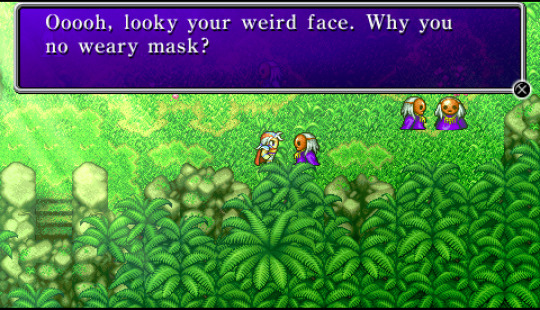
Graphics:
Final Fantasy II is actually a quite nice looking game, as with the rest of the Final Fantasy releases on PSP. Locations have a lot of detail to them, like ambient effects like rolling fog, and noticeable lighting effects, with a few areas like Pandemonium having pretty fascinating designs, and there’s some pretty good looking cutscenes for bigger story events. Spell animations are pretty neat, and attack spells have a nice detail where their animations become more elaborate as you level them up more. Characters even finally look accurate to their original art by Yoshitaka Amano, unlike earlier versions, though that’s not necessarily a positive: between Firion’s random mishmash of materials and colors, Maria and Guy’s awkward, half complete outfits, and the terrifyingly gaudy Emperor, this is possibly the tackiest looking cast in the series. The monster designs, on the other hand, are top notch. After Final Fantasy I’s bestiary was lifted almost entirely out of D&D, this game introduced a lot of original and iconic enemies, like the coeurls, the bombs, the malboros, the adamantoises, and the behemoths. It even introduced chocobos, though it’s easy to miss their existence, as their confined to one spot on the world map that’s decently hidden. While there are still a lot of oddities like vampires and giant mantises, it’s still one of the biggest advancements in the series in this regard. The enemy designs also excel in that they look much more threatening than in the first game. These enemies literally come from Hell, and look the part. I’d even go so far as to say that this is the best looking Final Fantasy game on the PSP, and has some of the coolest enemy designs in the series.
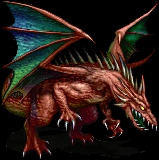
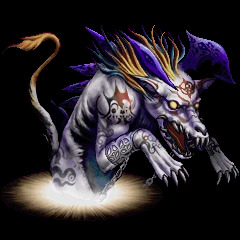
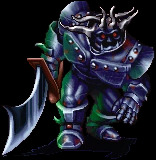
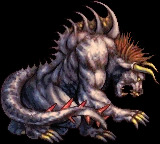
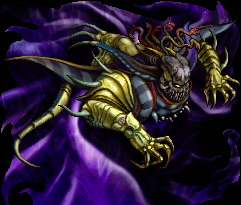
Sound:
Final Fantasy II’s soundtrack was composed by Nobuo Uematsu, as usual, and remixed by Tsuyoshi Sekito for the remakes. All things considered, it’s my least favorite soundtrack in the main series. That’s not to say it’s bad at all, and there are some great tracks like the Rebel Army Theme, the somber main theme which plains on the overworld, Ancient Castle, the Tower of the Magi, Battle Theme A, typically used for major boss encounters, and Battle Theme 2, the final boss theme. However, as an overall, it’s just not quite as good as the soundtracks for the rest of the main series, to me. It also contains my least favorite version of the Prelude, being just a bit too high pitched for my liking, and my least favorite battle theme, sounding way too intense just for regular encounters, and quickly becoming grating not too far into the game. The soundtrack is good in its own right, and is worth a listen, it just doesn’t quite reach the heights that some of the others do.
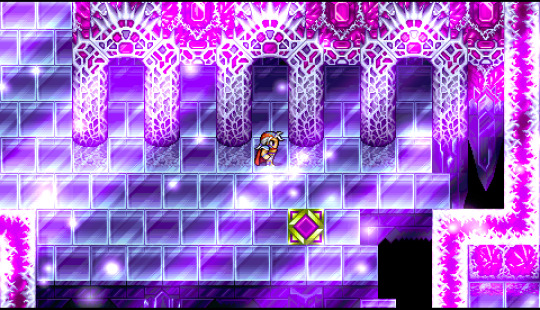
Conclusion:
Overall, I give Final Fantasy II a firm not recommended. Though very ambitious and important for its day, its story, design, and mechanics have aged like milk compared to the other Final Fantasy games on the NES. While technically still perfectly playable, especially with deeper knowledge as to how the mechanics work, it doesn’t make for much fun at all. You’re better off keeping your distance from this entry.
Now, with this absurdly long review finally done, finishing this game, and the subject of my next review, hopefully to be soon, have convinced me I need a break from older RPGs for a while. Till next time.
-Scout
6 notes
·
View notes
Text
█ ▌ @tragicbutinnocent asked:
"Do you not think Firion's wild rose is a sign of hope and dreams?" (Terra Branford)
🌀 What end game was this doll attempting to hopelessly achieve?

“I loathe roses. Specifically that same wild rose Fynn yielded upon their banners. Why should I find peace knowing its blooms and thorns oppose me?”
#tragicbutinnocent#terra.#asks| flail and staff#a desert rose is more fitting.#they should raise those of the palamecian desert pon their flags instead.
1 note
·
View note
Text
@wildroseprincess
[ ♛ ] – This year’s blizzard had been rather unforgivable, having come earlier than expected and throwing all of Palamecia into a frenzy to gather what supplies they could, in turn causing chaos among the townspeople as fights begun to break out over who was to get what. It was a seemingly never-ending conflict that soon became a migraine for the emperor, having grown tired of being a mediator for every little thing that was being fought about --- within a month, Mateus just sat back and watched brawls break out, letting the guards and Leonhart handle them instead. A king could only have so much patience.
A miracle, however, that today was naught but peaceful thus far.
Laying back against the pillows, a long drag is taken from the hookah sitting beside the emperor, smoke being held in for a moment before being released through his nostrils. Mateus was going to take advantage of this quiet while it lasted, he deserved it, having dealt with his people’s squabbles almost non-stop since the arrival of the blizzard.
Lavenders watch Koda as the translator busied himself pouring tea for both him and the imperial, his quiet humming ceasing once he notices Mateus’ eyes upon his person. “You alright, sire?” He asks, “I know events lately haven’t been quite to your liking, and you’ve been more quiet than usual all morning.”
An eyebrow is raised. “Am I not allowed to enjoy the quiet I was blessed with?”
“I mean, of course you are! It’s just that you tend to be more talkative in my presence, especially when you have the chance to have breaks like this.”
“Perhaps I haven’t a thing to say.” Mateus smirks, taking another hit from his hookah. “Not once during this commotion have I been allowed to be alone with my thoughts enough to have much to discuss.” Repetitive discussions of existence of course, and the emperor’s never ending journey to figure out what his “true identity” was. Koda was finally spared of that for once.
The translator can only muster a weak laugh in response, placing a teacup within Mateus’ reach as he took a seat at the foot of the bed with his own. Perhaps his concerned comment was an outlandish one, but Koda could not help but worry for his master at times, even if he was told not to. Lips part so he could speak once more, but stopped as a guard frantically rushed into the room, his breathing oddly labored.
“Your majesty! T-There’s someone at the front gate t-to see you--!”
“Oh, bother.” Cue pursed lips and a rolling of eyes, “Come now, spit it out, who wishes an audience with me?”
The guard takes a moment to catch his breath before responding. “The Queen of Fynn! S-She’s here, along with some of the rebels!” He exclaims, flinching as the emperor sat up abruptly, clawed hands clenching the sheets beneath him. Hilda and the rebels were here? Strange feelings begun to take over, a part of Mateus wanting to be enraged at the possibility of having to tangle with the likes of Firion again, but the other part was awash in emotions and feelings that were better off sleeping within the depths of the mind --- love was a terrible, terrible lass.

Heavens, what could Hilda possibly be here for, much less in this kind of horrendous weather? Mayhaps she came to take God’s head, to display it as a trophy for all to see, or she was only to be a distraction while Firion and the others planned to make another attempt on his life. The possibilities felt endless, and Mateus about got lost within them had Koda not shook him out of it.
“Sire! What do you suggest we do?”
“W-Well let them in!” Mateus sputters, “Should push come to shove, we can always subject them to the beasts within the coliseum’s dungeons, or I will deal with them personally.” Try as he might, sudden anxiety was making it difficult for the emperor to put on his signature calm and collected mask, and if the other two took notice, they certainly didn’t mention it. Koda and the guard only nodded, the latter bowing before rushing out, his yelling being heard throughout the halls.
“So much for relaxing.” Mateus sighed, rising up to his feet before glancing at Koda. “Let us get ready then. Come.”
#wildroseprincess#[ ɪɴ ᴛʜᴏᴜꜱᴀɴᴅꜱ ᴏꜰ ᴀɢᴏɴɪᴇꜱ ; ɪ ᴇxɪꜱᴛ. ] ic#[ V002: ɪɴ ʜᴇʟʟ ʏᴏᴜ ᴀʀᴇ ᴀʟᴏɴᴇ & ɪɴ ʜᴇʟʟ ʏᴏᴜ ᴡᴇᴇᴘ. | endgame ]
1 note
·
View note